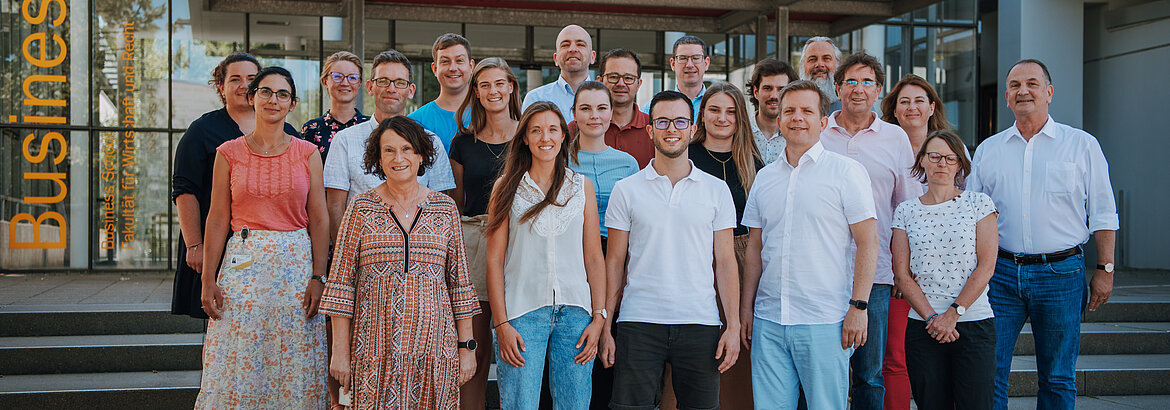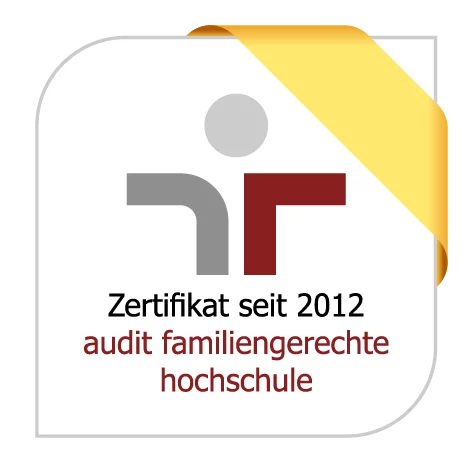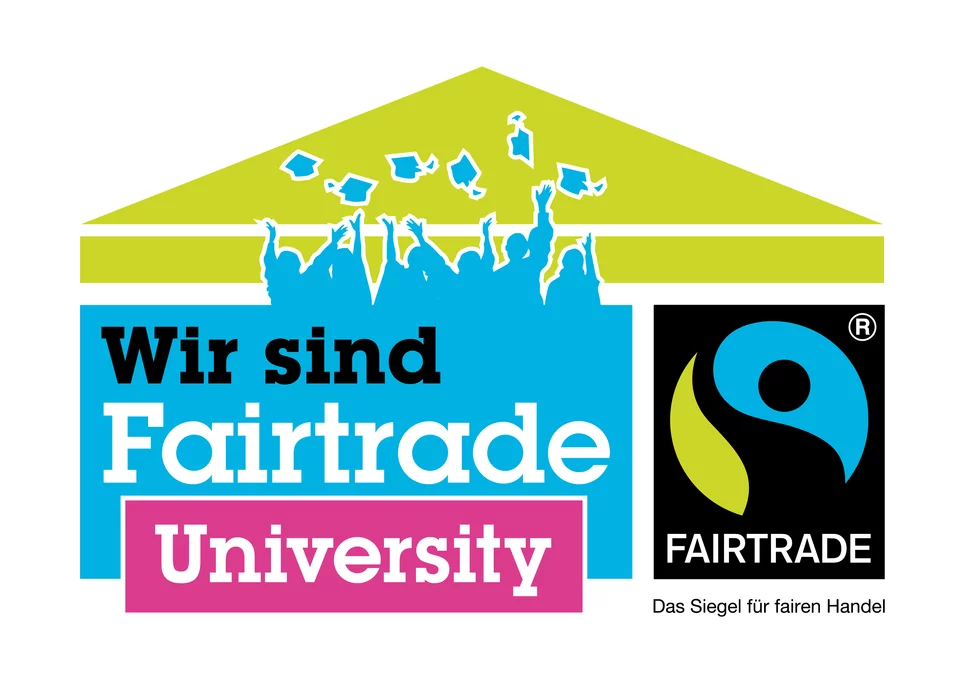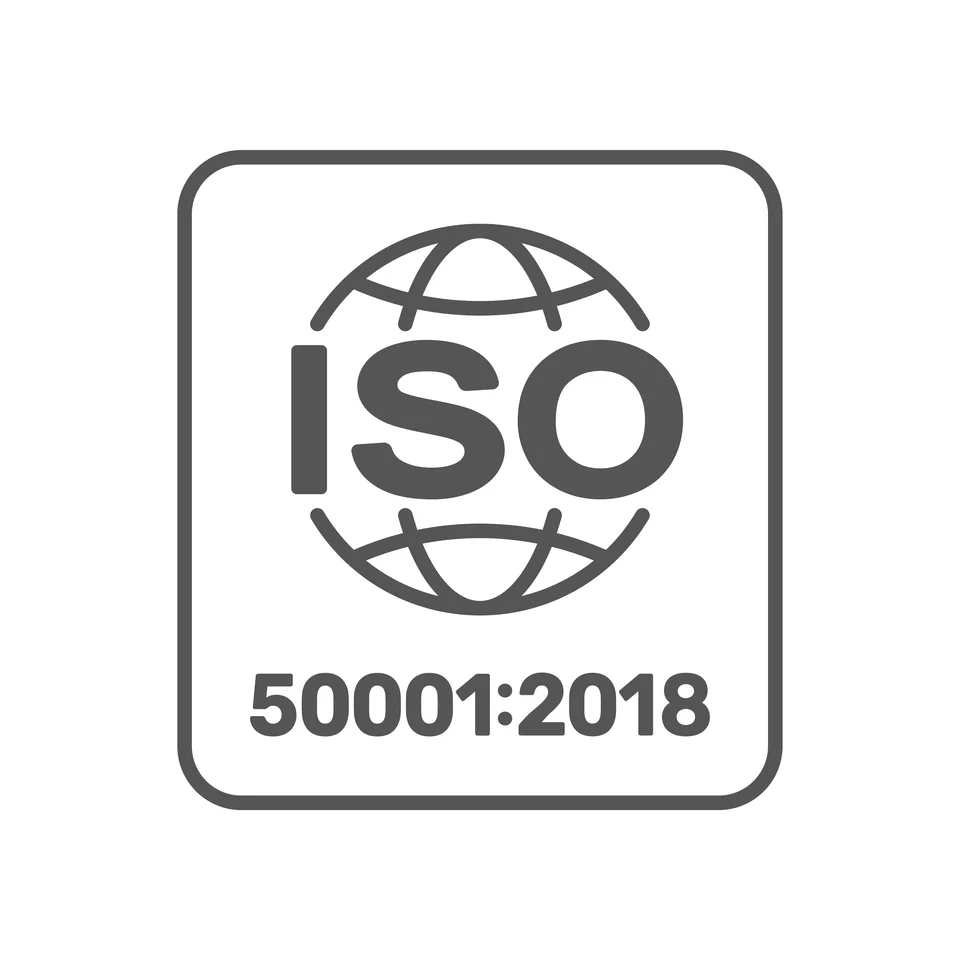- 1978 - 1980 studied physics and mathematics at the University of Freiburg i. Br.
- 1980 - 1985 studied physics and astronomy at the University of Heidelberg
- 1985 - 1986 civilian service
- 1986 - 1989 Scientist at Institute for Energy and Environmental Research Heidelberg
- 1989 - 1990 Officer at the ministry for environment of the German federal state of Hamburg
- 1991 - 1999 Senior Consultant at ifeu GmbH Heidelberg GmbH
- since 1999 Professor for Environmental Management at Pforzheim University, Faculty of Economics
- since 2015 Honorary Professor at Leuphana University Lueneburg, Faculty of Sustainability
- since 1996 Examiner for the registration of environmental verifiers (EMAS) in Germany
- 2002 - 2014 Director of the Institute of Applied Research IAF
- 2002 - 2013 Member of the Senat of Pforzheim University
- since 2004 Member of the Advisory Board for Applied Research of the Ministry of Research Baden-Wuerttemberg
- 2004-2014 Spokesman of the directors of the Institutes of Applied Research in Baden-Wuerttemberg
- since 2010 Academic Director of Institute for Industrial Ecology
- 2011-2014 Founding director of the new study program "Resource Efficiency Management (B.Sc.)"
- 2012-2021 Member of the Advisory Board for Sustainable Development of the state of Baden-Wuerttemberg
- 2014-2015 Founding director of the new study program "Life Cycle & Sustainability (M.Sc.)"
- since 2014 Co-Editor of the Journal UmweltWirtschaftsForum (Springer Publ.)
- 2015- 2017 Member of the Executive Committee of Baden-Wuerttemberg Center for Applied Research (BW-CAR)
- since 2016 Director of Ph.D. programs together with Prof. Grunwald at K.I.T. (Karlsruhe)
- since 2017 personal member of the Heidelberg Center for the Environment (HCE) at Heidelberg University
- 2018 - 2019 Editor-in-Chief of "Sustainability Management Forum" alongside Prof. Schneidewind and Prof. Günther
- since 2021 Member of the Resource Commission of the Federal Environment Agency
- since 2022 Member of the Environmental Label Jury (Blue Angel) and Deputy Chairman
- since 2022 Member of the jury for the award of the Baden-Württemberg State Research Prize
- Member of ISO/DIN and VDI committees
Books
Schmidt, M. et al. (2016): 100 Betriebe für Ressourceneffizienz. Bd. 1, Springer-Verlag: Heidelberg
Schmidt, M., Schwegler, R.: Umweltschutz und strategisches Handeln, 2003, Gabler: Wiesbaden
Scientific Papers
Schmidt, M, Heinrich, J., Huensche, I. (2024): Carbon Footprint of Additively Manufactured Precious Metals Products, Resources 2024, 13(11), 162; https://doi.org/10.3390/resources13110162
Rudolf, M., Schmidt, M. (2024): Efficiency, sufficiency and consistency in sustainable development: Reassessing strategies for reaching overarching goals, Ecological Economics 227, 108426, https://doi.org/10.1016/j.ecolecon.2024.108426
Schmidt, M. (2024): Klimaneutralität — der richtige Weg oder nur Greenwashing? wisu - das wirtschaftsstudium. Zeitschrift für Ausbildung, Prüfung, Berufseinstieg und Fortbildung 5/24, 479-480.
Schebek, L., Dosch, K., Faulstich, M., Hagelüken, C.,Jaeger-Erben, M., Nuss, P., Schmidt, M. (2024): Indikatoren im Themenfeld Ressourcenschonung und Circular Economy. Grundlagen und Anforderungen für die Entwicklung konsistenter Indikatorensysteme. Dessau-Roßlau: Umweltbundesamt. https://doi.org/10.60810/openumwelt-7418.
Fritz, B., Peregovich, B., da Silva Tenório, L., da Silva Alves, A.C., Schmidt, M. (2024): Mercury and CO2 emissions from artisanal gold mining in Brazilian Amazon rainforest. Nature Sustainability 7, 5-22, doi: 10.1038/s41893-023-01242-1.
Hagelüken, C, Schmidt, M. et al. (2023): Opportunities and limits of recycling in the context of the circular economy. framework conditions, requirements, and recommendations for action. Dessau-Roßlau: German Environment Agency. https://doi.org/10.60810/openumwelt-3552.
Fritz, B., Heidak, P., Vasters, J., Kuhn, T., Franken, G., Schmidt, M. (2023): Life cycle impact on climate change caused by metal production from deep sea manganese nodules versus land-based deposits. Resources, Conservation and Recycling 193: 106976. doi:10.1016/j.resconrec.2023.106976.
Schmidt, M. (2021): The Resource-Energy Nexus as a Key Factor for the Circular Economy, In: Chem. Ing. Tech. 2021, 93, No. 11, doi:10.1002/cite.202100111
Schmidt, M., Nill, M., Scholz, J. (2021): Die Bedeutung der Lieferkette für den Klimafußabdruck von Unternehmen. In: Chem. Ing. Tech. 2021, 93, No. 11, doi:10.1002/cite.202100126
Schmidt, M. Klimaschutz, Ressourcenschonung und Circular Economy als Einheit denken / Thinking of climate protection, resources conservation and the circular economy as a unit (2021): NachhaltigkeitsManagementForum. https://doi.org/10.1007/s00550-021-00521-9
Schäfer, P., Schmidt, M. Model-based analysis of the limits of recycling for its contribution to climate change mitigation (2021): NachhaltigkeitsManagementForum. https://doi.org/10.1007/s00550-021-00515-7
Issaoui, R., Rösch, C., Woidasky, J., Schmidt, M., Viere, T. (2021): Cradle-to-gate life cycle assessment of beneficiated phosphate rock production in Tunisia. In: Sustainability Management Forum (ehemals Umweltwirtschaftsforum), Springer-Verlag, in Druck.
Fritz, B., Schmidt, M. (2021): Der erstaunliche Klimafußabdruck von Recycling-Gold. Nachrichten aus der Chemie 69, Juni 2021, S. 30-32, doi:10.1002/nadc.20214105392
Reisch, L., Schmidt, M. (2021): Nachhaltige Entwicklung. In: Kenning, P., Oehler, A., Reisch, L. (2021): Verbraucherwissenschaften. Rahmenbedingungen, Forschungsfelder und Institutionen. Springer Gabler: Wiesbaden. S. 71-91.
Roßmann M., Stratmann M., Rötzer N., Schäfer P., Schmidt M. (2021): Comparability of LCAs — Review and Discussion of the Application Purpose. In: Albrecht S., Fischer M., Leistner P., Schebek L. (eds) Progress in Life Cycle Assessment 2019. Sustainable Production, Life Cycle Engineering and Management. pp. 213-225. Springer, Cham. https://doi.org/10.1007/978-3-030-50519-6_15
Fritz B., Schmidt M. (2021): Analysis of Life Cycle Datasets for the Material Gold. In: Albrecht S., Fischer M., Leistner P., Schebek L. (eds) Progress in Life Cycle Assessment 2019. Sustainable Production, Life Cycle Engineering and Management. pp 99-112. Springer, Cham. https://doi.org/10.1007/978-3-030-50519-6_8
Schmidt, M. (2021): Gehen uns die Rohstoffe aus? Ressourceneffizienz und nachhaltige Industriegesellschaft. In: Aurel Croissant (Hrsg.): Ressourcen. Rohstoffe, Daten, Menschen. Heidelberg University Publishing. S.111-124. https://doi.org/10.17885/heiup.studg.2021.1.24412
Springer, S., Peregovich, B., Schmidt, M. (2020): Capability of Social Life Cycle Assessment for Analyzing the Artisanal Small-Scale Gold Mining Sector – Case Study in the Amazonian Rainforest in Brazil. The International Journal of Life Cycle Assessment. https://doi.org/10.1007/s11367-020-01828-3
Preiß, M., Haubach, C., Schmidt, M. (2019): Why Does Material Efficiency Stay in the Shades of Energy Efficiency? In: Ludwig, C., Valdivia, S. (Eds.): Progress towards the resource revolution. Paul Scherrer Institute: Villigen. ISBN 978-3-9521409-8-7. S. 145-149.
Schmidt, M. (2019): Wie knapp sind unsere Rohstoffe? Eine kritische Reflexion einer alten und kontroversen Diskussion. In: Galvanotechnik 8/2019, S. 1566-1574.
Schmidt, M. (2019): Effizienz als Grundvoraussetzung für nachhaltigen Konsum. In: Boos, A., Brönneke, T., Wechsler, A. (Hrsg.): Konsum und nachhaltige Entwicklung. Nomos/Baden-Baden, S. 27-43
Anstätt, K., Bertagnolli, F., Schmidt, M. (2018): Nachhaltigkeitspotentiale aufdecken, in: Hühn, Ch. et al. (Hrsg.): Planspiele - Interaktion gestalten: Über die Vielfalt der Methode (ZMS-Schriftenreihe; Bd. 10), 2018, S. 123-138.
Schmidt, M. (2018): Saving Money while Reducing the Environmental Impact. Industrial Product Review, Vol. 2, Issue 5, p. 50-52.
Schmidt, M. (2018): Natürliche Ressourcen. Wie knapp ist was? In: Norbert Jost, Simon Kött (Hrsg.): Tagungsband zum Pforzheimer Werkstofftag 2018. Band 168. ISSN 0946-3755, S. 5-16.
Reisch, L.A., Schmidt, M. (2017): Nachhaltige Entwicklung. In: Kenning, P. et al. (Hrsg.): Verbraucherwissenschaften - Grundlagen und Cases. S. 103 - 122. Springer-Verlag Berlin/Heidelberg.
Preiß, M., Haubach, C., Schmidt, M. (2017): 100 Betriebe für Ressourceneffizienz – ein Leuchtturmprojekt für den Umweltschutz. Horizonte Nr. 50, S. 24-29.
Rohn, H., Simon, F.-G., Schmidt, M. et al. (2017): The Guideline Series VDI 4800 Resource Efficiency: An Approach for Increasing Resource Efficiency with the Aim of Conservation of Natural Resources in the Industrial Sector. In: Ludwig, C., Matasci, C. (Eds.) (2017): BOOSTING RESOURCE PRODUCTIVITY by Adopting the Circular Economy. A World Resources Forum Production. S. 125- 132. Printed by Paul Scherrer Institute Villigen PSI - October 2017
Schmidt, M. (2017): The 100 Companies Project. Resource Efficient Practice Cases from Producing Industry In: H. Lehmann (ed.), Factor X, Eco-Efficiency in Industry and Science 32, S. 347-358. Springer-Verlag Berlin Heidelberg.
Bertagnolli, F., Lang-Koetz, C., Schmidt, M. (2017). Zusammenhänge zwischen den Ansätzen Lean Management und Ressourceneffizienz Management. In: H. Biedermann, S. Vorbach, W. Posch (Hrsg.) Transformationen - Neue Wege zu industrieller Nachhaltigkeit. Sustainability Management for Industries 7. S. 61-72. Rainer Hampp. Augsburg, München.
Schmidt, M., Raqué, C. (2015): Betriebliche Treibhausgasbilanzierung in der Witzenmann GmbH, Horizonte, Vol. 46, S. 17-20
Viere, T. et al. (2014): Integrated Resource Efficiency Analysis for Reducing Climate Impacts in the Chemical Industry. In: Journal of Business Chemistry 2014, 11 (2), 67-76
Schmidt, M., Schneider, M. (2013): Ressourceneffizienz spart Produktionskosten. In: Rohn, H.; Lettenmeier, M., Pastewski, N. (Hrsg.) :Ressourceneffizienz – Potenziale von Technologien, Produkten und Strategien. Erste Auflage, 256 S. Fraunhofer Verlag: Stuttgart, 2013. S. 9-19
Schmidt, M. (2013): Einordnung in das Forschungsfeld Ressourceneffizienz. In: Woidasky, J., Ostertag, K., Stier, C. (Hrsg.): Innovative Technologien für Resourceneffizienz in rohstoffintensiven Produktionsprozessen. Fraunhofer-Verlag: Stuttgart, S. 395-406.
Schmidt, M. (2013): Was haben Ressourceneffizienz und Lean Production gemeinsam? In: Klinke, S., Rohn, H. (Hrsg.): RessourcenKultur: Vertrauenskulturen und Innovationen für Ressourceneffizienz im Spannungsfeld normativer Orientierung. Nomos-Verlag Baden-Baden. S. 279-294.
Haubach, C., Moser, A., Schmidt, M., Wehner, C. (2013): Die Lücke schließen – Konsumenten zwischen ökologischer Einstellung und nicht-ökologischem Verhalten. Wirtschaftspsychologie, ISSN 1615-7729, 15. Jg., Heft 2, S.33-47.
Schmidt, M., Raqué, C. (2012): Climate & Carbon Calculator for Companies (CliCCC) - mit wenigen Kennzahlen zur Emissionsbilanz. In: Gleich, R., Bartels, P., Breisig, V. (Hrsg.): Nachhaltigkeitscontrolling. Konzepte, Instrumente und Fallbeispiele für die Umsetzung, Haufe Freiburg. S. 267-283.
Schmidt, M. (2012): Resource efficiency in manufacturing companies – cost and greenhouse gas emission savings. 10th Ecobalance 2012 in Yokohama "Challenges and Solutions for Sustainable Society", No. 100128, 4 Pages; published electronically.
Schmidt, M. (2012): Optimisation and game theory approaches for allocation in LCAs. 10th Ecobalance 2012 in Yokohama "Challenges and Solutions for Sustainable Society", No. 100130, 4 pages, published electronically.
Liedtke, C., Schmidt, M. (2011): Unternehmensnahe Instrumente - der Überblick. In: Hennicke, P., Kristof, K. (Hrsg.): Aus weniger mehr machen. Strategien für eine nachhaltige Ressourcenpolitik in Deutschland. oekom-Verlag München. S.102-118
Görlach, S., Schmidt, M. (2011): Public Efficiency Awareness & Performance: Was zu tun ist, damit Ressourceneffizienz gelingt. In: Hennicke, P., Kristof, K. (Hrsg.): Aus weniger mehr machen. Strategien für eine nachhaltige Ressourcenpolitik in Deutschland. oekom-Verlag München. S.130-140
Schmidt, M., Hottenroth, H., Schottler, M., Fetzer, G., Schlüter, B. (2011): Life Cycle Assessment of Silicon Wafer Processing for Microelectronic Chips and Solar Cells. International Journal of Life Cycle Assessment Vol. 17, Nr. 1, S. 126–144, DOI 10.1007/s11367-011-0351-1
Hottenroth, H., Schottler, M., Schmidt, M. (2011): Minderung von Kohlenwasserstoffemissionen in der Solarzellenfertigung – Eine ökobilanzielle Betrachtung. Chemie Ingenieur Technik Vol. 83, Nr. 10, S. 1642 ff.
Schmidt, M. (2011): Von der Material- und Energieflussanalyse zum Carbon Footprint - Anleihen aus der Kostenrechnung. Chemie Ingenieur Technik Vol. 83, Nr. 10, S. 1541 ff.
Schmidt, M. (2011): Energie- und Stoffstromanalyse. RKW Rationalisierungs- und Innovationszentrum der Deutschen Wirtschaft e.V. Kompetenzzentrum, Faktenblatt: 1/2011
Schmidt, M. (2011): Materialflusskostenrechnung. RKW Rationalisierungs- und Innovationszentrum der Deutschen Wirtschaft e.V. Kompetenzzentrum, Faktenblatt: 2/2011
Görlach, S., Schmidt, M. (2010): Maßnahmenvorschläge zur Ressourcenpolitik im Bereich unternehmensnaher Instrumente. Feinanalysepapier für den Bereich Public Efficiency Awareness & Performance. Wuppertal-Institut für Klima, Umwelt, Energie, Ressourceneffizienz Paper 4.4, ISSN 1867-0237
Schmidt, M. (2009): Principle of causality or market price principle – what really leads us further in allocating the greenhouse gas emissions? In: VHB/TU Dresden (Hrsg.): Klimawandel - eine Herausforderung für die BWL. Dresdner Beiträge zur Betriebswirtschaftslehre Nr. 150-09. ISSN 0945-4810. 14 Seiten.
Görlach, S., Lemken, T., Liedtke, C., Onischka, M., Schmidt, M., Viere, T. (2009): Unternehmensnahe Instrumente, Systematisierung unternehmensnaher Instrumente bzw. von Instrumentenclustern sowie Grobrasterung und Instrumenten-auswahl zur Vorbereitung auf die Phase der Feinanalyse.
Paper 4.1 zum BMU/UBA-Projekt „Materialeffizienz und Ressourcenschonung (MaRess)“, Juli 2009, Wuppertal-Institut für Klima, Umwelt und Energie: Wuppertal (ISSN 1867-0237)
Schmidt, M. (2009): Why do companies ignore economic efficiency potentials? The need for public efficiency awareness. In: Bleischwitz, R., Welfens, P.J.J., Zhang, Z. (Ed.): Sustainable Growth and Resource Productivity, Sheffield (UK), p.157-170.
Schmidt, M., Haubach, C., Walter, S. (2009): Auf das µ kommt es an – Klimaschutz in Unternehmen. In: Mahammad Mahammadzadeh/Hendrik Biebeler/Hubertus Bardt (Hrsg.), 2009: Klimaschutz und Anpassung an die Klimafolgen – Strategien, Maßnahmen und Anwendungsbeispiele, Köln 2009, ISBN 3602148475, 10 Seiten
Lambrecht, H., Schmidt, M., Möller, A. (2009): Stoffstromnetze aus Sicht der Optimierungstheorie. In Heyde, F., Löhne, A., Tammer C. (Eds.): Heyde, C. Tammer. Methods of Multicriteria Decision Theory and Applications, 2009, Aachen, ISBN 978-3-8322-8180-9, S. 79-94
Walter, S., Schmidt, M. (2009): Geeignete Rechnungslegung und Aggregationsebenen der kumulierten Emissionsintensität in Unternehmen. Umweltwirtschaftsforum Vol.17, No.2, 179-189.
Schmidt, M. (2009): Ressourceneffizientes Produzieren in Betrieben. In:Baumgartner, R.J., Biedermann, H., Zwainz, M. (Hrsg.): Öko-Effizienz. Konzepte, Anwendungen und Best-Practices, Rainer Hampp Verlag Mering, S. 145-159.
Schmidt, M. (2009): Carbon Accounting and carbon footprint. International Journal of Climate Change Strategies and Management, Vol. 1, No. 1, 19-30.
Lambrecht, H., Schmidt, M., Möller, A. (2009): Stoffstromnetze aus Sicht der Optimierungstheorie. In: Heyde, F., Löhne, A., Tammer C. (Eds.): Methods of Multicriteria Decision Theory and Applications, 2009, Aachen, ISBN 978-3-8322-8180-9, S. 79-94.
Lambrecht, H., Schmidt, M. (2008): Einsatz von Operations-Research-Methoden in Stoffstromnetzen. Chemie Ingenieur Technik 2008, 80, No. 9, S. 1379-1380.
Haubach, C., Schmidt, M. (2008): Erweiterung der Systemgrenzen betrieblicher Umweltinformationssysteme – Integration der Supply Chain am Beispiel der „CO2-Rechner“. In: INFORMATIK 2008. Beherrschbare Systeme dank Informatik. Proceedings Band 2. Lecture Notes in Informatics 134. ISBN 978-3-88579-228-4. S. 867-872.
Görlach, S., Hottenroth, H., Schmidt, M. (2008): Tackling the conservation of natural resources in complex societies – an insoluble task? Journal of Industrial Ecology (submitted)
Hottenroth, H., Schäfer, W., Schmidt, M. (2008): Herstellerverantwortung beim Recycling von Elektro- und Elektronikaltgeräten. Horizonte Nr. 32, S. 13-18
M. Schmidt, R. Schwegler (2008): A recursive ecological indicator system for the supply chain of a company. In: Journal of Cleaner Production. doi:10.1016/ j.jclepro.2008.04.006
Schmidt, M. (2008): The Sankey Diagram in Energy and Material Flow Management. Part II: Methodology and Current Applications. Journal of Industrial Ecology Vol. 12 No. 1. DOI: 10.1111/j.1530-9290.2008.00015.x
Schmidt, M. (2008): The Sankey Diagram in Energy and Material Flow Management. Part I: History. Journal of Industrial Ecology Vol. 12 No. 1. S. 82-94
M. Schmidt (2008): Die Bedeutung der Effizienz für Nachhaltigkeit – Chancen und Grenzen. In: Susanne Hartard et al. (Hrsg.): Ressourceneffizienz im Kontext der Nachhaltigkeitsdebatte. Nomos-Verlag: 2008. S. 31-46
R. Schwegler, M. Schmidt (2008): Ressourceneffizienz in Unternehmen: Erfolgsfaktoren und Hemmnisse. In: Susanne Hartard et al. (Hrsg.): Ressourceneffizienz im Kontext der Nachhaltigkeitsdebatte. Nomos-Verlag: 2008.S. 161-181
M. Schmidt (2007): Nachhaltigkeit und Ressourceneffizienz - Anforderungen an künftige KSS-Techniken. In: F. Ebert (Hrsg.): Das 17. Deutsche Kühlschmierstoff-Forum. Technik+Kommunikations Verlags GmbH Berlin. S.221-229
M. Schmidt (2007): EINBLIK erfasst CO2-Emissionen entlang der Supply Chain. Dow Jones TradeNews Emissions, 2007, Nr. 1, S.9-12.
M. Schmidt (2007): Praxisnahe Methodenentwicklung im Umweltbereich. Umweltwirtschaftsforum Jg. 15, Heft 2/07, S. 82-85.
M. Schmidt, C. Raible, R., Keil, M. Gräber (2007): Energy and Material Stream Mapping. In: Hilty, L.M., Edelmann, X., Ruf, A. (Eds.): Recovery of Materials and Energy for Resource Efficiency. R07 World Congress Davos 2007. ISBN 978-3-905594-49-2. 6 S.
H. Lambrecht, A. Möller, M. Quent, M. Schmidt (2007): Konzeptionelle Grundlagen zur Verbesserung von Produktionsprozessen durch Kopplung von Simulations- und Optimierungsverfahren. In: J. Wittmann, V. Wohlgemuth (Hrsg.): Simulation in Umwelt- und Geowissenschaften: Workshop Berlin 2007. ISBN 3832263373. 8 Seiten
M. Schmidt, H. Hottenroth (2007): History and Methodology of the Sankey Diagram. In: Hilty, L.M., Edelmann, X., Ruf, A. (Eds.): Recovery of Materials and Energy for Resource Efficiency. R07 World Congress Davos 2007. ISBN 978-3-905594-49-2. 10 S.
Schmidt, M., Lambrecht, H., Möller, A. (2007): Optimisation Approaches in Material Flow Models of Manufacturing Systems. In: Hryniewicz, O., Studzinski, J., Romaniuk, M. (Eds.): Environmental Informatics and System Research. Vol. 1. 21st. International Conference on Informatics for Environmental Protection Sept. 2007, Warsaw, Poland. S. 271-278
R. Keil, M. Schmidt (2007): Material Efficiency in Higher Education - Requirements Regarding Teaching and their Practical Realisation in a New Simulation Game. In: Hilty, L.M., Edelmann, X., Ruf, A. (Eds.): Recovery of Materials and Energy for Resource Efficiency. R07 World Congress Davos 2007. ISBN 978-3-905594-49-2. 6 S.
H. Hottenroth, R. Keil, M. Schmidt, E. Borghetto (2007): Efficient Organization of Material and Information Flows Considering Interfaces in the Extended Supply Chain in the Electronic Industry. In: Hilty, L.M., Edelmann, X., Ruf, A. (Eds.): Recovery of Materials and Energy for Resource Efficiency. R07 World Congress Davos 2007. ISBN 978-3-905594-49-2. 6 S.
Moeller, A., Prox, M., Schmidt, M. (2006): Interpretations of the Principle of Cause and Effect and Applications in Quantitative Eco-Efficiency Analysis. Extended abstract. 2nd International Conference on Quantified Eco-Efficiency Analysis for Sustainability. 28.-30. Juni 2006. Leiden University. 6 Seiten
Schmidt, M., Ehrenberger, S. (2006): A Partial Model Approach for Life Cycle Inventory Analysis. The Society of Non-Traditional Technology (Ed.): Proceedings of The Seventh International Conference on EcoBalance, 14.-16. Nov. 2006, Tsukuba Japan, S. 245-248
Laurin, L., Möller, A., Prox, M., Schmidt, M. (2006): How production-theory can support the analysis of recycling sys-tems in the electronic waste sector. In: International Symposium on Electronics and the Environment (ISEE) and the Electronics Recycling Summit® 2006. San Francisco
Schmidt, M., Schwegler, R. (2005): Beyond LCA: Measuring the Ecological Efficiency of Sites or Companies. In: Euro-pean Society for Ecological Economics (Ed.): ESEE 2005 – 6th International Conference of the European Society for Eco-logical Economics. Lisbon – Portugal. 101 und E-Paper 239 (11 Seiten)
Schmidt, M., Schwegler, R. (2005): Ecological Benchmarking on Company Level: Measuring the Ecological Efficiency of Sites or Companies. In: Royal Institute of Technology Stockholm Sweden (Ed.):Industrial Ecology for Sustainable Fu-ture. The 3rd International Conference of the International Society for Industrial Ecology, ISIE. S.76-78
Schmidt, M. (2004): Die strategische Lücke im Umweltmanagement? In: Institut der Deutschen Wirtschaft (Hrsg.): Betriebliche Instrumente für nachhaltiges Wirtschaften. Köln, S. 175-183
Lässig, B., Rall, F., Schmidt, M., Schottler, M. (2004): Decision making for the installation of environment protection equipment in semiconductor manufacturing, in: Reichl, H. et al. (Eds): Electronics goes green 2004+, Fraunhofer IRB-Verlag, Stuttgart, S. 809-814
Hedemann, J., Möller, A., Müller-Beilschmidt, P., Rohdemann, D., Schmidt, M., Schmitt, B. (2004): Integration of material flow management tools in workplace environments, in: L.M. Hilty, E. Seifert, R. Treibert (eds.): Towards Information Systems for Sustainability, London, S. 47-61
Schmidt, M. (2002): Verknüpfung gekapselter Produktionsmodelle durch Stoffstromnetze und Einbindung von Tools des Operations Research. In: Fichtner, W., Geldermann, J. (Hrsg.): Einsatz von OR-Verfahren zur techno-ökonomischen Analyse von Produktions¬systemen. Frankfurt/M. S. 75-94
Schmidt, M. (2002): Methodische Ansätze zur Analyse und Auswertung betrieblicher und produktbezogener Stoff-stromsysteme. In: Technologiefolgenabschätzung – Theorie und Praxis. Forschungszentrum Karlsruhe, Nr. 1, 11. Jg., S. 9-15
Schmidt, M. (2001): Betriebliche Informationssysteme. In: BMU/UBA (Hrsg.): Handbuch Umweltcontrolling. Vahlen München. 2. Aufl., S. 575-595
Schellenberg, T.E., Siegenthaler, C.P., Schmidt, M. (2000): Teaching eco-efficiency based on a corporate environmental management case study. In: Nath, B. (eds.): Environmental Education and Awareness, Encyclopedia of Life Support Systems Publishers Co. Ltd. Oxford UK, UNESCO
Schmidt, M. (2000): Computergestützte Stoffstromanalysen – hat das Unternehmen einen Nutzen davon? In: L. M. Hilty (Hrsg.): Strategische und betriebsübergreifende Anwendungen betrieblicher Umweltinformationssysteme. Marburg. S.25-36
Schmidt, M. (2000): Betriebliches Stoffstrommanagement. In: H. Dyckhoff: Umweltmanagement. Zehn Lektionen in umweltorientierter Unternehmensführung. Springer Berlin/ Heidelberg. S. 121-150
Schmidt, M. (1999): Betriebliche (Umwelt-) Kostenrechnung mit Umberto 3. In: H. J. Bullinger et al. (Hrsg.): Betriebliche Umweltinformationssysteme in der Praxis. Fraunhofer-Institut Institut f. Arbeitswirtschaft und Organisation Stutt-gart. S. 219-248
Möller, A., Schmidt, M., Rolf, A. (1998): Ökobilanzen und Kostenrechnung von Produkten. In: H. D. Haasis , K.C. Ranze (Hrsg.): Umweltinformatik 98. Vernetzte Strukturen in Informatik, Umwelt und Wirtschaft. Bremen, S. 165-178
Schmidt, M. (1998): Verkehrsvermeidung und Globalisierung – Widerspruch oder Chance? In: Umweltwirtschaftsforum 2/6. Juni 1998. S. 77-79
Schmidt, M. (1998): EMAS – Kein Platz für den Produktbezug? In: Informationsdienst Ökologisches Wirtschaften. Schwerpunktheft „Perspektiven des Öko-Audit-Systems“ 3-4/1998. S. 16-18.
Schmidt, M. (1998): Ein leistungsfähiger Allokationsansatz für Stoffstromsysteme mit Kuppelprodukten aus der Pro-duktionstheorie. In: R. Frischknecht, S. Hellweg (Hrsg.): „Ökobilanz-Allokationsmethoden. Modelle aus der Kosten- und Produktionstheorie sowie praktische Probleme in der Abfallwirtschaft“. Diskussionsforum der ETH Zürich. Juni 1998. 2. Aufl., S. 35-41
Schmidt, M. et al. (1997): Environmental Material Flow Analysis by Network Approach. In: Geiger, W. et al. (Hrsg.): Umweltinformatik `97. Vol. II. Metropolis Marburg.768-779
Hilty, L., Schmidt, M. (1997): Der fraktale Produktlebensweg. In: Umweltwirtschaftsforum 3/5. September 1997. S.52-57
Schmidt, M. (1996): Öko-Audit versus Ökobilanz - Konkurrenz oder sinnvolle Ergänzung? In: UnternehmensGrün (Hrsg.), Konkurrenten oder Partner? Ökobilanzen und Öko-Audit im Vergleich. München. 1996, S. 29-38
Schmidt, M., Freese, H., Seidel, J. (1996): Wirkungsanalyse und Bewertung der Ergebnisse aus der Ökobilanzierung. In: Ranze et al. (Hrsg.): Intelligente Methoden zur Verarbeitung von Umweltinformationen. 2. Bremer KI-Workshop. S. 137-152
Schmidt, M. (1996): Die normative (Brems)Kraft der Modellbildung für eine fortschrittliche Verkehrs- und Umweltpolitik. In: H. B. Keller et al. (Hrsg.): Werkzeuge für Simulation und Modellbildung in Umweltanwendungen. Wissen-schaftliche Berichte des Forschungszentrums Karlsruhe FZKA 5828. S. 165-176
Schmidt, M., Meyer, U., Mampel, U. (1996): Prozeßmodellierung und Datenstruktur in Stoffstromnetzen. In: A.-W. Scheer et al. (Hrsg.): Computergestützte Stoffstrommanagement-Systeme. Metropolis-Verlag, S. 25-38
Frings, E., Schmidt, M. (1995): Die Stoffstromanalyse. In: Umweltwirtschaftsforum UWF 4/95, S. 92-96
Schmidt, M., Hetzel, I. (1995): Die Modellierung von Straßenverkehrsmengen und Schadstoffemissionen für kommu-nale Klimaschutzkonzepte. In: H. Kremers et al. (Hrsg.): Raum und Zeit in Umweltinformationssystemen. Metropolis-Verlag. Marburg. S. 610-617
Schmidt, M. (1995): Stoffstromanalysen als Basis für ein Umweltmanagementsystem im produzierenden Gewerbe. In: H.-D. Haasis et al. (Hrsg.): Umweltinformationssysteme in der Produktion. Metropolis-Verlag. Marburg. S. 67-80
Schmidt, M., Petersen, R., Höpfner, U. (1994): Energieverbrauch und Schadstoffemissionen der Stadtverkehrsmittel, In: D. Apel et al. (Hrsg.): Handbuch der kommunalen Verkehrsplanung. Abschnitt 2.5.4.1.
Schmidt, M. (1994): Integrierte Verkehrsplanungsansätze im Rahmen von kommunalen Emissionsminderungs- und Klimaschutzkonzepten. In: Verein Deutscher Ingenieure: Verkehrskonzepte für Ballungsräume. VDI-Bericht Nr. 1138. S. 61-74
Schmidt, M., Meyer, U., Möller, A. (1994): Neue Möglichkeiten der Ökobilanzierung mit Computerprogrammen auf der Basis von Petrinetzen. In: K. Totsche et al. (Hrsg.): ECO-INFORMA '94. Fachtagung für Umweltinformation und Umweltkommunikation am 5.-9. September 1994 an der TU Wien. Umweltbundesamt Wien. S. 123-134
Schmidt, M., Giegrich, J., Hilty, L. (1994): Experiences with ecobalances and the development of an interactive software tool. In: L.M.Hilty et al. (Hrsg.): Informatik für den Umweltschutz. 8. Symposium Hamburg. S. 101-108
Schmidt, M., Knisch, H. (1995): Traffic Impact Assessment. Lines of Approach for Considering Traffic Avoidance in Planning. In: M. Jerichon (Hrsg.): 1st Ecomove Congress 25.-27. Mai 1994 in Kassel. Universität Gesamthochschule Kassel. S.90-97
Schmidt, M., Hetzel, I. (1995): Handlungsansätze zum Klimaschutz im kommunalen Verkehrsbereich. In: M. Jerichon (Hrsg.): 1st Ecomove Congress 25.-27. Mai 1994 in Kassel. Universität Gesamthochschule Kassel. S.268-277
Schmidt, M. (1995): Data and method problems in energy and emission accounting. In: Bundesministerium für Umwelt, Naturschutz und Reaktorsicherheit: Environmental Policy. Local Authority Climate Protection in the Federal Re-public of Germany. S. 137-141
Schmidt, M. (1994): Possibilities for and Limits to CO2 Reduction for Local Communities. In:OECD/ ICLEI: How to Combat Global Warming at the Local Level. Heidelberg Conference September 7-9, 1994. S. 29-36
Schmidt, M. (1991): The new recommendations of the ICRP - no progress of radiological protection. In: International Perspectives in Public Health. Vol. 7. S. 20-28
Schmidt, M. (1990): Der Diskussionsstand zum Strahlenkrebsrisiko und notwendige Konsequenzen für den Strahlenschutz. WSI-Mitteilungen 12/90. 769-776
Franke, B., Giegrich, J., Heinstein, F., Schmidt, M. (1990): Bewertung des Krebsrisikos durch Emissionen mit der Abluft von Müllverbrennungsanlagen. In: Müll und Abfall Nr. 2. S. 3-8
Schmidt, M. (1988): Der Vermeidungsgedanke im Abfallwirtschaftsbereich. In: Felix von Cube, Volker Storch: Umweltpädagogik - Ansätze, Analysen, Ausblicke. Edition Schindele. Heidelberg.
Schmidt, M. (1988): The Health Impact of the Chernobyl Fallout on the Population of West-Germany. In: International Perspectives in Public Health, Vol 4, 1, p. 2-6
Schmidt, M., Wehrse, R. (1987): Discrete Ordinate Matrix Method. In: W. Kalkofen. Numerical Radiative Transfer. Cambridge University Press. p. 341-371
Popular publications:
Handelsblatt: Der Fluss des Materiellen, 1. Aug. 2019
Umweltdialog: Wer das Klima retten will, benötigt auch Rohstoffe, Mai 2019
Schmidt, M. (2015): Die HAWs haben Forschungspotenziale, die besser genutzt werden könnten! Horizonte 45 / 2015, S. 24.
Schmidt, M. (2009): Wo bleiben die Rohstoffe im System? Intelligenter Produzieren 2009/2, S. 2-3
Schmidt, M. (2007). EINBLIK erfasst CO2-Emissionen entlang der Supply Chain. Dow Jones Emission News 2007, Nr.1, S. 9-12.
Schmidt, M., Hroch, N. (2005): Nicht ausgeschöpfte Potentiale. Umweltforschungs-Journal Baden-Württemberg. S. 42
Thum, R., Schmidt, M. (2005): Forschung zwischen Hoffen und Bangen. Die Neue Hochschule 1, S. 30-32
Deutsche Post (2003): Umweltbericht 2003
Schmidt, M., Schwegler, R. , Keil, R. (2001): Ökologie und Ökonomie in Unternehmen – nicht nur ein Schlagwort. In: Horizonte – Forschung an Fachhochschulen in Baden-Württemberg. Nr. 18 Mai 2001. S.44-47
Heidelberger Verkehrs- und Versorgungsbetriebe (HVV): Umwelterklärung 1998 (Aktualisierung von 1996)
Schmidt, M. (1995): Öko-Audit - Hohe Erwartungen und viele offene Fragen. In: Politische Ökologie Nr. 41. S.14-15
Schmidt, M. (1994): Rechenoperation gelungen. Bei der Erstellung der Lebenswegbilanz "Verpackungssysteme" wurden zahlreiche Probleme gelöst. In: Müllmagazin 1/1994. S. 25-28
Prof. Dr.-Ing. Claus Lang-Koetz
Deputy Director
claus.lang-koetz(at)hs-pforzheim.de
Phone: +49 72 31 / 28 - 64 27
- Design of innovation processes in companies
- Organizational models and evaluation methods of strategic technology management
- Integration of sustainability aspects into the innovation management of companies
- Integrated innovation and sustainability analysis in the development of eco-innovations, together with development partners from industry and research
- Technology potential assessments and studies: identification and evaluation of new technologies and assessment of possible environmental impacts in economy and society
- novel innovation principles for the development of sustainable products and solutions such as fresh innovations
Higher Education
- 1993 - 1994 Studies of Computer Science, University of Saarland
- 1994 - 2000 Studies of Environmental Engineering, University of Stuttgart (degree: Dipl.-Ing.)
- 1998 - 2000 Studies of Water Resources Engineering and Management, University of Stuttgart (degree: M. Sc.)
- 1997/1998 Stay abroad at University of Utah, Salt Lake City, USA
- 2000 Stay abroad at Montana State University, Bozeman, USA
- 2006 Dissertation (Dr.-Ing.) at the Faculty of Mechanical Engineering at the University of Stuttgart with the topic "A model for the implementation of an environmental controlling process on the basis of an ERP system."
Work Experience
- 2000 - 2005 Researcher and consultant at Institute for Technology Management (IAT) at University of Stuttgart
- 2005 - 2009 Researcher, as of 2006 head of group „Innovative Technologies“, Fraunhofer Institute for Industrial Enginerering IAO, Stuttgart
- 2009 - 2014 Head of Innovation Management, Eisenmann AG, Böblingen
Selection
Herrmann, T., Zimmerer, A., Lang-Koetz, C., Woidasky, J. (2023): The Climate Impact of the Usage of Headphones and Headsets. In: Hesser, F., Kral, I., Obersteiner, G., Hörtenhuber, S., Kühmaier, M., Zeller, V., Schebek, L. (Hrsg): Progress in Life Cycle Assessment 2021. Springer International Publishing, Cham, S 7–22. doi:10.1007/978-3-031-29294-1_2.
Wagner, V., Keil, M., Lang-Koetz, C., Viere, T. (2023): Screening life cycle assessment of medical workwear and potential mitigation scenarios. Sustainable Production and Consumption 40: 602–612. doi:10.1016/j.spc.2023.07.026.
Preiss, P., Puteanus-Birkenbach, K., Lang-Koetz, C. (2023): Coaching Concept to Improve the Sustainability Impact of Students’ Startup Ideas in an Early Stage. In: Block, J.H., Halberstadt, J., Högsdal, N., Kuckertz, A., Neergaard, H. (Hrsg): Progress in entrepreneurship education and training. New methods, tools, and lessons learned from practice. Springer, Cham, S 87–106. doi:10.1007/978-3-031-28559-2_7.
Bilgram, V., Cañadas Link, D., Lang-Koetz, C. (2023): Generative KIs in Kreativprozessen: Praxiserfahrungen aus den ersten Monaten mit ChatGPT & Co. Zeitschrift Ideen- und Innovationsmanagement. doi:10.37307/j.2198-3151.2023.01.07.
Lang-Koetz, C., Reischl., A., Fischer, S., Weber, S., Kusch, A. (2023): Ambidextres Innovationsmanagement in KMU - Praxisnahe Konzepte und Methoden. Springer Gabler, Berlin Heidelberg.
Lang-Koetz, C., Schimpf, S. (2022): Nachhaltigkeit als Innovationstreiber. IHK Magazin Nordschwarzwald: 8–9.
Lang-Koetz, C. (2022): Management. In: Sand, G. (Ed.): Wege zur autonomen Produktion. Ein Kompass von Innovatoren für Innovatoren. Steinbeis-Edition, Stuttgart, pp. 150–154.
Bosch, N., Brandenburg, N., Enzler, S., Fischer, S., Kho, N., Lang-Koetz, C., Luger, M., Maier, P., Reichmann, S., Reischl, A., Weber, S., Witzke, M., Zwirner, T. (2022): Neue Wege für das Innovationsmanagement in KMU durch Blended Learning und firmenübergreifenden Austausch. In: Nitsch, V., Brandl, C., Häußling, R., Lemm, J., Gries, T., Schmenk, B. (Hrsg): Digitalisierung der Arbeitswelt im Mittelstand - Band 1: Ergebnisse und Best Practice des BMBF-Forschungsschwerpunkts „Zukunft der Arbeit: Mittelstand – innovativ und sozial“. Springer, Berlin, pp. 133–171. doi:10.1007/978-3-662-64803-2.
Reischl, A., Weber, S., Fischer, S., Lang-Koetz, C. (2022): Contextual Ambidexterity: Tackling the Exploitation and Exploration Dilemma of Innovation Management in SMEs. Int. J. Innovation Technol. Management. doi:10.1142/S0219877022500067.
Preiss, P., Reischl, A., Witt, P., Lang-Koetz, C. (2022): Innovationen nachhaltiger gestalten - ein Werkzeugkoffer für das Nachhaltigkeitscoaching. Hochschule Pforzheim, Pforzheim. pdf-Download
Treick, A., Woidasky, J., Lang‐Koetz, C. (2022): Object Identification Technologies as Key Enabler for Circular Business Models. Chemie Ingenieur Technik 94: 479–492. doi:10.1002/cite.202100107.
Berndt, T., Lang-Koetz, C. (2022): Circular Economy – Chance für Innovation – Eine Methode zur kreativen Entwicklung von Circular-Economy-Geschäftsmodellen. I40M 2022: 33–36. doi:10.30844/I40M_22-1_33-36.
Abele, T., Hutschek, U., Lang-Koetz, C., Heger, T. (2021): Hybrider Foresight-Ansatz am Beispiel Nachhaltigkeit ([reedition] ed.). In: Gausemeier, J., Bauer, W., Dumitrescu, R. (Ed.): Vorausschau und Technologieplanung, pp 149–173. pdf download
Schmidt, J., Auer, M., Moesslein, J., Wendler, P., Wiethoff, S., Lang‐Koetz, C., Woidasky, J. (2021): Challenges and Solutions for Plastic Packaging in a Circular Economy. Chemie Ingenieur Technik 93: 1751–1762. doi:10.1002/cite.202100110.
Kusch, A.; Gasde, J.; Deregowski, C.; Woidasky, J.; Lang-Koetz, C.; Viere, T. (2021): Sorting and Recycling of Lightweight Packaging in Germany — Climate Impacts and Options for Increasing Circularity Using Tracer-Based-Sorting. Mater Circ Econ 3, 10 (2021). https://doi.org/10.1007/s42824-021-00022-6
Preiß, P; Bohem, M. E.; Gusbeth, C.; Sack, M.; Herzog, D.; Schwartz, T.; Dekold, S.; Poboss, N.; Lang-Koetz, C.; Frey, W. (2021) Less Chemicals and More Power: Pulsed Electric Field-Treatment for Reduction of Microorganisms. In: Weißgraeber P., Heieck F., Ackermann C. (Hrsg.) Advances in Automotive Production Technology – Theory and Application. ARENA2036. Springer Vieweg, Berlin, Heidelberg. https://doi.org/10.1007/978-3-662-62962-8_36
Gasde, J.; Woidasky, J.; Moesslein, J.; Lang-Koetz, C. (2021): Plastics Recycling with Tracer-Based-Sorting: Challenges of a Potential Radical Technology. Sustainability, 13, 258. https://doi.org/10.3390/su13010258
Woidasky, J., Auer, M., Schmidt, J., Kusch, A., Gasde, J., Lang-Koetz, C., Wiethoff, S., Sander, I., Schau, A., Richards, B.S., Turshatov, A., Busko, D., Treick, A., Wendler, P., Kirchenbauer, D., Wacker, D., Fuchs, F., Moesslein, J. (2021): „Tracer-Based-Sorting“ in der Verpackungs-Abfallwirtschaft. Müll und Abfall. doi:10.37307/j.1863-9763.2021.07.05. pdf-Download.
Gasde, J.; Preiss, P.; Lang-Koetz, C. (2020). Integrated Innovation and Sustainability Analysis for New Technologies: An approach for collaborative R&D projects. Technology Innovation Management Review, 10 (2), 37-50. doi:10.22215/timreview/1328
Gasde, J.; Lang-Koetz, C.; Woidasky, J.; Moesslein, J. (2020): Plastics Recycling with Tracer-Based Sorting: Challenges of a Potential Radical Technology, in: Proceedings of The ISPIM Innovation Conference – Innovating in Times of Crisis, 7-10 June 2020. LUT Scientific and Expertise Publications: ISBN 978-952-335-466-1
Lang-Koetz, C.; Reischl, A.; Sorg, F. (2020): Umweltwirkungen von Innovationsideen bewerten und verbessern mit dem Tool „Green Check Your Idea“, Zeitschrift für Ideen- und Innovationsmanagement, Heft 2 2020, S. 62-66, Erich Schmidt Verlag, Berlin, ISSN 2198-3143. https://doi.org/10.37307/j.2198-3151.2020.02.08
Reischl, A.; Lang-Koetz, C.; Weber, S.; Fischer, S. (2020): Contextual ambidexterity: Tackling the exploitation and exploration dilemma in SMEs through two different innovation management approaches, in: Proceedings of The ISPIM Innovation Conference – Innovating in Times of Crisis, 7-10 June 2020. LUT Scientific and Expertise Publications: ISBN 978-952-335-466-1
Woidasky, J.; Moesslein, J.; Wendler, P.; Kirchenbauer, D.; Wacker, D.; Gao, G.; Lang‐Koetz, C. (2020): Kunststoffidentifikation und ‐sortierung in der Circular Economy durch Fluoreszenzmarker. In: Chemie Ingenieur Technik 92 (4), pp. 441-451. DOI: 10.1002/cite.201900126. https://onlinelibrary.wiley.com/doi/full/10.1002/cite.201900126
Woidasky, J.; Sander, I.; Schau, A.; Moesslein, J.; Wendler, P.; Wacker, D.; Gao, G.; Kirchenbauer, D.; Kumar, V.; Busko, D.; Howard, I. A.; Richards, B. S.; Turshatov, A.; Wiethoff, S.; Lang-Koetz, C. (2020): Inorganic fluorescent marker materials for identification of postconsumer plastic packaging; Journal: Resources, Conservation & Recycling 161 (2020) 104976, Elsevier, ISSN: 0921-3449. https://doi.org/10.1016/j.resconrec.2020.104976
Gasde, J.; Preiss, P.; Lang‐Koetz, C. (2020): Integrated Innovation and Sustainability Analysis for New Technologies: An approach for collaborative R&D projects. In: Technology Innovation Management Review 10 (2), S. 37–50. http://doi.org/10.22215/timreview/1328.
Woidasky, J.; Gasde, J.; Lang-Koetz, C.; Moesslein, J.: Tracer-Based Sorting als Querschnittstechnologie für die Kreislaufwirtschaft. In: Holm, O.; Thomé-Kozmiensky, E.; Goldmann, D.; Friedrich, B. (Hrsg.): Recycling und Sekundärrohstoffe – Band 13. Thomé-Kozmiensky-Verlag, Neuruppin, 2020, S. 257-266. ISBN 978-3-944310-51-0.
Woidasky, J.; Schmidt, J.; Auer, M.; Sander, I.; Schau, A.; Moesslein, J.; Wendler, P.; Kirchenbauer, D.; Wacker, D.; Gao, G.; Turshatov, A.; Richards, B. S.; Wiethoff, S.; Lang-Koetz. C. (2020): Photoluminescent Tracer Effects on Thermoplastic Polymer Recycling. In: Christian Hopmann; Rainer Dahlmann (Hrsg.): Advances in Polymer Processing 2020. Proceedings of the International Symposium on Plastics Technology. Springer Vieweg, Berlin, Heidelberg; S. 1-13; https://doi.org/10.1007/978-3-662-60809-8_1 (ISBN 978-3-662-60808-1).
Preiss, P.; Lang-Koetz, C.; Frey, W.; Fröhlich, G. (2019): Nutzung der Elektroimpulstechnologie zur Keimreduktion in industriellen Wässern und Lacken als nachhaltige Alternative zur Verwendung von Bioziden? Beitrag im Tagungsband der Industrietage Wassertechnik 2019 14.-15. November 2019, DECHEMA-Haus, Frankfurt am Main.
Gasde, J.; Preiss, P.; Lang-Koetz, C. (2019): Integrated Innovation and Sustainability Analysis in collaborative R&D projects, in: The ISPIM Innovation Conference – Celebrating Innovation: 500 Years Since da Vinci, Florence, Italy on 16-19 June 2019, The International Society for Professional Innovation Management (ISPIM).
Gasde, J., Klinke, C., Woidasky, J., Lang-Koetz, C. (2019): Integrierte Innovations- und Nachhaltigkeitsanalyse im Bereich Sortierung und Verwertung von LVP-Abfällen, in: Bockreis, A. et al. (eds.): Tagungsband des 9. Wissenschaftskongress „Abfall- und Ressourcenwirtschaft“ 2019, 14.-15. März 2019 in Amberg.
Lang-Koetz, C., Wolfram, P.; Rehder, F.; Böhner, J.; Hack, C. (2019): Nachhaltigkeit als Impulsgeber für das strategische Technologie- und Innovationsmanagement im Mobilitätssektor am Beispiel des Unternehmens BROSE, In Gausemeier, J.; Bauer, W.; Dimitrescu, R. (Hrsg.), Vorausschau und Technologieplanung. 15. Symposium für Vorausschau und Technologieplanung, 21. und 22. Nov. 2019, Band 390 der Verlagsschriftenreihe des Heinz Nixdorf Instituts der Universität Paderborn, ISBN: 978-3-947647-09-5, S. 29-47, pdf-Download.
Lang-Koetz, C.; Schimpf, S. (2019): The integration of sustainability aspects into innovation management - current state and future potential, in: Proceedings of the R&D Management Conference 2019, June 19-21, 2019, Paris, France.
Lang-Koetz, C.; Schimpf, S. (2019): Nachhaltigkeit im Innovationsmanagement. Eine Studie zur Untersuchung der Integration von Nachhaltigkeitsaspekten im Innovationsmanagement deutscher Industrieunternehmen, Hochschule Pforzheim, pdf-Download.
Schimpf, S.; Lang-Koetz, C. (2019): Der Halo-Effekt einer guten Visualisierung: Die Roadmap Umwelttechnik Baden-Württemberg, in: Abele, T. (ed.) (2019): Case-Study Lehrbuch für das Technologie- und Innovationsmanagement, pp. 41-58, ISBN 978-3-658-25067-6, Springer Gabler, Wiesbaden, https://www.springerprofessional.de/erfolgreiches-roadmapping-der-halo-effekt-einer-guten-visualisie/16757116.
Woidasky, J.; Lang-Koetz, C.; Oßwald, K. (2019). Innovationen bei der Identifikation von Werkstoffen (Teil 1). Galvanotechnik, 110 (11), pp. 2148-2151. Eugen G. Leuze Verlag KG, Bad Saulgau.
Woidasky, J.; Oßwald, K.; Lang-Koetz, C. (2019). Innovationen bei der Identifikation von Werkstoffen (Teil 2). Galvanotechnik, 110 (12), pp. 2330-2333. Eugen G. Leuze Verlag KG, Bad Saulgau.
Schimpf, S.; Lang-Koetz, C.; Masior, J.; Rötzer, N. (2017): Guidance for environmental technology development of the future: A concise methodology to develop an integrated technology roadmap in the German State of Baden-Württemberg. In: Proceedings of the R&D Management Conference 2017. Leuven, Belgium, July 2-5, 2017.
Bertagnolli, F.; Lang-Koetz, C.; Schmidt, M. (2017): Zusammenhänge zwischen den Ansätzen Lean Management und Ressourceneffizienz Management. In: H. Biedermann, S. Vorbach, W. Posch (Hg.): Transformationen - Neue Wege zu industrieller Nachhaltigkeit. Sustainability Management for Industries 7. Sustainability Management for Industries 7. Augsburg, München: Rainer Hampp, S. 61–72.
Lang-Koetz, C., Reischl, A. (2017): Assessing and improving environmental impact of innovation ideas: Proceedings of the R&D Management Conference 2017. Leuven, Belgium, July 2-5, 2017.
Lang-Koetz, C., Flohr, D. (2017): Umweltfreundlich, material- und energiesparend? Additive Fertigungsverfahren aus Perspektive der Ressourceneffizienz. Sprache und Literatur 46. Jahrgang, 2015, 1.-2. Halbjahr: 39–51.
Preiss, P., Lang-Koetz, C. (2017): Integrated Innovation and Sustainability Analysis of Selected Disinfection Technologies - Integration of market and environmental perspectives; Poster ID TU-630-56. 2017, LCM2017 - Life Cycle Management Conference 2017, September 3 - 6, Luxembourg.
Lang-Koetz, C. (2016): Neue Technologien als Befähiger für ressourceneffiziente Produkte und Dienstleistungen. In: Abele, T. (Eds.), Die frühe Phase des Innovationsprozesses - Neue, praxiserprobte Methoden und Ansätze (pp. 51-73). SpringerGabler, https://www.springerprofessional.de/neue-technologien-als-befaehiger-fuer-ressourceneffiziente-produ/10557354.
Wohlfart, L., Bünger, M., Lang-Koetz, C., & Wagner, F. (2016): Corporate and Grassroot Frugal Innovation: A Comparison of Top-Down and Bottom-Up Strategies. Technology Innovation Management Review, 6(4): 5-17. http://doi.org/10.22215/timreview/977
Rummel, S., Lang-Koetz, C. (2016): Technology monitoring for production technologies in the automation industry: A framework for enabling competitive manufacturing for the future: Proceedings of the R&D Management Conference 2016 , July 3-6, Cambridge, Great Britain.
Böhner, J.; Lang-Koetz, C.; Weeber, M.; Steinhilper, R. (2016): Integrating Resource Efficiency in Learning Factories for Industrial Engineering, in: Proceedings of the International Conference on Manufacturing Engineering COMA 2016, Wallenberg Centre (STIAS), Stellenbosch, South Africa, Jan 27-29 2016.
Wohlfart, L.; Bünger, M.; Lang-Koetz, C.; Wagner F. (2015): The two faces of frugal innovation – bridging gaps to foster successful innovation strategies, in: Proceedings of The ISPIM Innovation Summit, Brisbane, Australia on Dec 6-9.
Wichert, P.; Lang-Koetz (2015): Eisenmann - Technologiemonitoring als wichtiger Baustein zur frühzeitigen Adaption neuer Technologien und Verfahren im Anlagenbau, in: Warschat, J.; Schimpf, S.; Korell, M. (Hrsg.) (2015): Technologien frühzeitig erkennen, Nutzenpotenziale systematisch bewerten, S. 115-133, ISBN 978-3-8396-0881-4, Fraunhofer Verlag, Stuttgart. pdf Download
Christoph, B., Eberhard, J., Hoppe,G., Lang-Koetz, C., Pulli, K., Strohbeck, U., Urich, T., Woll, B. (2014): Energieeffiziente Trockner, in: Neugebauer, R. (Hrsg.): Innovationsallianz "Green Carbody Technologies" - InnoCaT Forschung für die Energie- und Ressourceneffizienz im Automobilbau, S. 160-163, ISBN 978-3-8396-0624-7, Fraunhofer Verlag, Stuttgart.
Lang-Koetz, C. (2013): Technologiemonitoring zur Unterstützung von Forschung- und Entwicklung im Anlagenbau, in: Abele, T. (Hrsg.) (2013): Suchfeldbestimmung und Ideenbewertung. Methoden und Prozesse in den frühen Phasen des Innovationsprozesses, S. 59-79, ISBN 978-3-658-02184-9, SpringerGabler, https://www.springerprofessional.de/technologiemonitoring-zur-unterstuetzung-von-forschung-und-entwi/4266094.
Lang-Koetz, C., Korell, M., Storz, T. (2013): A framework for technology monitoring in the plant engineering and manufacturing industry – results from the research project syncTech, in: Proceedings of the R&D Management Conference 2013, June 26-28, 2013, Manchester, Great Britain.
Lang-Koetz, C., Hinsch, A., Beucker, S. (2012): Dye Solar Cells, in: Lambauer, J., Fahl, U. und Voß, A. (Hrsg.): Nanotechnology and Energy – Science, Promises and Limits, S. Pan Stanford Publishing, Singapur, S. 114-128.
Lang-Koetz, C., Stellberger, G. (2012): Stimulating innovation and guiding research & development in a plant engineering and manufacturing company – a case study. In: Proceedings of the R&D Management Conference, 23.-25. 5. 2012, Grenoble, Frankreich.
Schimpf, S., Lang-Koetz, C. (2010): Technologiemonitoring. Technologien identifizieren, beobachten und bewerten, Stuttgart: Fraunhofer Verlag, Stuttgart, 49 Seiten, ISBN: 978-3-8396-0174-7, http://publica.fraunhofer.de/documents/N-146352.html
Lang-Koetz, C., Pastewski, N., Rohn, H. (2010): Identifiying new technologies, products and strategies for resource efficiency, in Chem. Eng. Technol. 33 (2010), No. 4, S. 559-566, WILEY-VCH Verlag, Weinheim. https://doi.org/10.1002/ceat.200900456
Spath, D., Warschat, J., Heubach, D., Laib, S., Lang-Koetz, C. (2010): Nutzung der Nanotechnologie mittels eines ontologiebasierten Ansatzes, Industrie-Management 26 (2010), Nr. 2, S. 28-32.
Lang-Koetz, C., Pastewski, N., Schimpf, S., Heubach, D. (2010): Resource efficiency as a key-driver for technology and innovation management. Dealing with an emerging trend in technology intelligence, International Journal of Technology Intelligence and Planning 6 (2010), No. 2, S. 164-184.
Spath, D., Lang-Koetz, C., Heubach, D., Laib, S., Lentes, J. (2009): Ontologiebasiertes Digital Engineering für die Nutzung emergenter Technologien in der Produktentwicklung am Beispiel der Nanotechnologie, in:
Schenk, M. (Hrsg.) (2009): Digital Engineering - Herausforderung für die Arbeits- und Betriebsorganisation, S. 289-314, GITO-Verlag, 2009 (Schriftenreihe der Hochschulgruppe für Arbeits- und Betriebsorganisation e.V.), Berlin.
Hinsch, A., Brandt, H., Veurman, W., Hemming, S., Nittel, M., Würfel, U., Putyra, P., Lang-Koetz, C., Stabe, M., Beucker, S., Fichter, K. (2009): Dye solar modules for facade applications: Recent results from project ColorSol, 17th International Photovoltaic Science and Engineering Conference, Fukuoka, Japan, 3-7 Dec 2007, Solar Energy Materials and Solar Cells, Volume 93, Issues 6-7, June 2009, S. 820-824, ISSN: 0927-0248, Elsevier, Amsterdam, doi:10.1016/j.solmat.2008.09.049
Lang-Koetz, C., Hinsch, A., Beucker, S. (2009): Farbige Solarzellen. Grundlage für eine attraktive gebäudeintegrierte Photovoltaik, in: Erneuerbare Energien, März 2009, S. 51-55, SunMedia Verlags GmbH, Hannover, 2009.
Lang-Koetz, C., Schimpf, S. and Pastewski, N. (2009): Resource efficiency as a key-driver for R&D and innovation: Dealing with an emerging trend in technology intelligence, in: Proceedings of the XX ISPIM Conference and the R&D Management Conference 2009, Vienna, Austria, 21-24 June 2009, ISBN 978-952-214-767-7, Wien, 2009.
Angerer, G.; Bauer, E.; Beckert, B.; Bierwisch, A.; Blümel, C.; Bradke, H.; Cuhls, K.; Doll, C.; Friedewald, M.; Gaisser, S.; Georgieff, P.; Gransche, B.; Hüsing, B.; Koch, D. J.; Klug, S.; Lüllmann, A.; Marscheider-Weidemann, F.; Reiß, T.; Schirrmeister, E.; Thielmann, A.; Vollmar, H. C.; von Horn, J.; Warnke, P.; Allmendinger, K; Ardilio, A.; Bienzeisler, B.; Buck, S. L.; Buck, H.; Ganz, W.; Heubach, D; Lang-Koetz, C.; Malcotsis, T.; Ohlhausen, P.; Pastewski, N.; Rogowski, T.; Rüger, M.; Schletz, A.; Schnalzer, K.; Stabe, M.; Warschat, J. (2009): Foresight-Prozess im Auftrag des BMBF. Etalblierte Zukunftsfelder und ihre Zukunftsthemen, Karlsruhe: Fraunhofer ISI, 141 S.
Angerer, G.; Bauer, E.; Beckert, B.; Bierwisch, A.; Blümel, C.; Bradke, H.; Cuhls, K.; Doll, C.; Friedewald, M.; Gaisser, S.; Georgieff, P.; Gransche, B.; Hüsing, B.; Koch, D. J.; Klug, S.; Lüllmann, A.; Marscheider-Weidemann, F.; Reiß, T.; Schirrmeister, E.; Thielmann, A.; Vollmar, H. C.; von Horn, J.; Warnke, P.; Allmendinger, K; Ardilio, A.; Bienzeisler, B.; Buck, S. L.; Buck, H.; Ganz, W.; Heubach, D; Lang-Koetz, C.; Malcotsis, T.; Ohlhausen, P.; Pastewski, N.; Rogowski, T.; Rüger, M.; Schletz, A.; Schnalzer, K.; Stabe, M.; Warschat, J. (2009): Foresight-Prozess im Auftrag des BMBF. Zukunftsfelder neuen Zuschnitts, Karlsruhe: Fraunhofer ISI, 141 S.
Pastewski, N., Lang-Koetz, C., Heubach, D., Haas, K.-H. (2009): Materialeffizienz durch Nanotechnologien und neue Materialien, Band 14 der Schriftenreihe der Aktionslinie Hessen-Nanotech des Hessischen Ministeriums für Wirtschaft, Verkehr und Landesentwicklung, HA Hessen Agentur GmbH, Wiesbaden.
Rohn, H., Lang-Koetz, C., Pastewski, N., Lettenmeier, M. (2009): Identifikation von Technologien, Produkten und Strategien mit hohem Ressourceneffizienzpotenzial, Ergebnisse eines kooperativen Auswahlprozesses, Meilensteinbericht aus dem Arbeitspaket 1 des MaRess-Projekts, Ressourceneffizienz Paper 1.2, Wuppertal Institut für Klima, Umwelt, Energie, Wuppertal, 29 S.,
urn:nbn:de:0011-n-1133103
Lang-Koetz, C., Beucker, S., Heubach, D. (2008): Estimating Environmental Impact in the Early Stages of the Product Innovation Process, in: Schaltegger, S. Bennett, M. Burritt, R. L. , Jasch, C. M. (Herausgeber): Environmental Accounting for Cleaner Production, Springer Science + Business Media B.V. 2008, S. 49-64.
Lang-Koetz, C., Ardilio, A., Warschat, J. (2008): TechnologieRadar. Heute schon Technologien für mor-gen identifizieren, in: Bullinger, H.-J.: Fokus Technologie. Chancen erkennen, Leistungen entwickeln. München: Hanser, 2008, S. 133-146.
Rohn, H., Lang-Koetz, C, Pastewski, N., Lettenmeier, M. (2008): Ressourceneffizienpotenziale durch Technologien, Produkte und Strategien – Erste Ergebnisse. Input aus dem Arbeitspaket 1 des MaRess-Projekts zur 3. Innovationskonferenz „Faktor X: Eine dritte industrielle Revolution“ am 22.10.2008 in Berlin, 1.1, Wuppertal, September 2008, ISSN 1867-0237.
Spath, D., Lang-Koetz, C., Beucker, S. (2007): Nachhaltiges Technologie-Roadmapping in Forschungsprojekten am Beispiel der Farbstoffsolarzellenentwicklung im BMBF-Verbundprojekt ColorSol, in: Gausemeier, Jürgen (Hrsg.): Vorausschau und Technologieplanung : 3. Symposium für Vorausschau und Technologieplanung, Heinz Nixdorf Institut, HNI-Verlagsschriftenreihe, 219, ISBN 978-3939350385, Universität Paderborn Heinz Nixdorf Inst., S. 72-96, Paderborn 2007.
Lang-Koetz, C. (2007): Einführung eines Umweltcontrollings mit informationstechnischer Unterstützung mittels ERP-System, in Zeitschrift für wirtschaftlichen Fabrikbetrieb (ZWF), Hanser Verlag, München, Jahrg. 102 (2007) 6, S. 394-397.
Lang-Koetz, C., Stabe, M., Mucha, M., Pastewski, N. (2007): Biotechnologie 2021 Chancen und Herausforderungen - Eine Agenda für Innovation und Forschung für die Bioindustrie der Zukunft, Fraunhofer IRB Verlag, 118 S. ISBN: 978-3-8167-7497-6, Stuttgart.
Lang-Koetz, C., Heubach, D. (2007): Umweltcontrolling einsetzen - Erstellung von Kennzahlen für Stoff- und Energieströme und deren Integration in die betriebliche IT. Ein Leitfaden für produzierende Unternehmen, Stuttgart: Fraunhofer IRB Verlag, 2007, 32 S. ISBN: 978-3-8167-7278-1
Möller, A., Wohlgemuth, V., Lang-Koetz, C. (2007): Gewinnung und Nutzung von Lebenszyklusdaten im betrieblichen Kontext, Projektbericht im Rahmen des Forschungsvorhabens FKZ 01 RN 0401 im Auftrag des Bundesministeriums fu?r Bildung und Forschung, Lüneburg Berlin Stuttgart Karlsruhe - Oktober 2007.
Lang-Koetz (2006): Ein Vorgehensmodell zur Einführung eines integrativen Umweltcontrollings auf Basis eines ERP-Systems, Jost-Jetter Verlag, Heimsheim, 144 S., ISBN 978-3936947939, zugl. Universität Stuttgart, Diss.
Rey, U., Lang-Koetz, C., Tuma, A. (Hrsg.) (2006): Betriebliche Umweltinformationssysteme – System- und unternehmensübergreifender Daten- und Informationsaustausch, ISBN 978-3832251147, 242 Seiten, Shaker Verlag, Aachen.
Beucker, S., Lang-Koetz, C. (2006): Computer-aided Resource Efficiency: How Software and a Common Data Format can Enhance the Assessment of Environmental Impacts and Costs along the Supply Chain, in: Sarkis, J. (Ed.): Greening the Supply Chain, Springer UK.
Lang-Koetz, C., Heubach, D., Beucker, S. (2006): Abschätzung von Umweltwirkungen in frühen Phasen des Produktinnovationsprozesses, in: Pfriem, R. et al. (Hrsg.): Innovationen für nachhaltige Entwick-lung, Deutscher Universitätsverlag, Wiesbaden, S. 417-432.
Lang-Koetz, C., Rey, U. (2006): Betriebliche Informationssysteme zur Unterstützung des Stoffstrommanagements, in: Rey, U., Lang-Koetz, C., Tuma, A. (Hrsg.): Betriebliche Umweltinformationssysteme – System- und unternehmensübergreifender Daten- und Informationsaustausch, Shaker Verlag, Aachen, 2006, S. 119-140.
Lang, C., Heubach, D., Loew, T. (2005): Using Software Systems to Support Environmental Manage-ment Accounting, in: Rihkardsson, P. M, Bennet, M., Bouma, J. J., Schaltegger, S. (Hrsg.): Implementing Environmental Management Accounting: Status and Challenges, pp. 143-168, Springer, Dordrecht.
Lang-Koetz, C., Loew, T., Beucker, S., Steinfeldt, M., Horstmann, U., Sieghart, T. (2005): Environmental Accounting Instruments: Implementation & Continuous Use – Concepts for the Application of Input-Output Balance, Environmental Performance Indicators and Flow Cost Accounting, in: Wagner, B., Enzler, S. (2005): Material Flow Management – Improving Cost Efficiency and Environmental Perfor-mance, Physica Verlag, Heidelberg.
Heubach, D., Beucker, S., Lang-Koetz, C. (2005): Einsatz von Nanotechnologie in der hessischen Umwelttechnologie – Innovationspotenziale für Unternehmen. Unternehmerbroschüre der Aktionslinie hessen-umwelttech und hessen-nanotech des Hessischen Ministeriums für Wirtschaft, Verkehr und Landesentwicklung, HA Hessen Agentur GmbH (Hrsg.), Wiesbaden.
Loew, T., Lang, C., Steinfeldt, M., Beucker, S., Keil, M., Heubach, D. (2004): Konzepte zur Implementierung und dauerhaften Anwendung der Instrumente Umweltbilanz, Umweltkennzahlen und Flusskostenrechnung, in: Institut der deutschen Wirtschaft (Hrsg.): Betriebliche Instrumente für nachhaltiges Wirtschaften - Konzepte für die Praxis, Deutscher Instituts-Verlag, Köln.
Steinfeldt, M., Mannhardt, J., Lang-Koetz, C. (2004): Betriebliches Wassermanagement bei der Fa. Ensinger Mineral-Heilquellen GmbH, in UmweltWirtschaftsForum, 12. Jg., H. 2, Juni 2004, Springer-Verlag 2004.
Steinfeldt, M., Lang, C. (2004): Implementierungs- und Institutionalisierungskonzept von Instrumenten des Umweltcontrolling - Von der Schwierigkeit einer dauerhaften Integration, in UmweltWirtschaftsForum, 12. Jg., H. 2, Juni 2004, Springer-Verlag.
Lang, C., Rey, U. (2004): Mit der Umwelt rechnen - Schnittstelle für den Datenaustausch zwischen BUIS und ERP-Systemen, in: WLB "Wasser, Luft und Boden", Vereinigte Fachverlage GmbH, Mainz 6/2004.
Lang, C., Jürgens, G. und Weil, C. (2002): Wer verschmutzt, zahlt - Umweltkennzahlensystem in SAP R/3, in: it - Industrielle Informationstechnik, Ausgabe 10, 39. Jahrgang, Hanser Verlag, München.
Prof. Dr.-Ing. Frank Bertagnolli
Lean Production and Resource Efficiency
frank.bertagnolli(at)hs-pforzheim.de
Phone: +49 72 31 / 28 - 63 72
Higher Education
- Dissertation (Dr.-Ing.) at the Faculty for Computer Science at the University of Karlsruhe, “Robot-supported automatic digitalization of work piece geometry by means of optical fringe projection”
- Studies of industrial engineering (degree: Dipl.-Wi.-Ing.) at the University of Karlsruhe, main topics: organization and management, robotics, manufacturing technology, and logistics
Work Experience
- since 2015 Professor for Lean Production and Resource Efficiency at Pforzheim University
- 2009 - 2015 Manager Lean Leadership Training and Education Lean Experts, Department for Lean Production Systems, Daimler AG, Stuttgart
- 2005 - 2009 Lean Production Systems and Lean Training Center, Daimler AG, Stuttgart
- 2001 - 2005 Research for Production Technologies, DaimlerChrysler AG, Center for Research and Technology Ulm
Publications
Pruhs, A., Kusch, A., Bertagnolli, F., Viere, T., Woidasky, J. (2023): Makigami im Produktentstehungsprozess - Einsatz einer Lean-Methodik zur Integration eines nachhaltigen und zirkulären Produktdesigns. I40M 2023: 55–60. doi:10.30844/IM_23-6_55-60.
Bertagnolli, F. (2023): Lean Empowerment; Die konsequente Fortsetzung von Lean Leadership. Schäffer-Poeschel, Stuttgart.
Bertagnolli, F. (2022): Lean Management; Introduction and In-Depth Study of Japanese Management Philosophy. Springer, Wiesbaden.
Bertagnolli, F., Bludau, S., Fetzer, L., Hadamek, L., Herrmann, T., Treick, A. (2022): Bienen an der Hochschule; Ein interdisziplinäres Nachhaltigkeitsprojekt. Springer Spektrum, Berlin, Heidelberg.
Bertagnolli, F., Philipp, A. (2022): Lean im Betrieb; Betriebliche Mitbestimmungsrechte bei Lean-Umsetzungen. Springer Gabler, Wiesbaden.
Anstätt, K., Bertagnolli, F., Schmidt, M. (Hrsg) (2022): Nachhaltigkeit und Ressourceneffizienz; Sechs Planspiele für die betriebliche Weiterbildung. Springer Gabler, Berlin.
Bertagnolli, F. (2022): Schnelles Rüsten; Prozessoptimierung in der Produktion spielend leicht verstehen und umsetzen. In: Voss, T., Voss, D. (Hrsg): Das METALOG FieldBook. Die Praxis der METALOG training tools in 58 Case Studies. Books on Demand, Norderstedt, S 284–287.
Bertagnolli, F., Herrmann, K., Rittmann, I., Viere, T. (2021): The Application of Lean Methods in Corporate Sustainability—A Systematic Literature Review. Sustainability 13: 12786. doi:10.3390/su132212786.
Bertagnolli, F., Waible, F. (2020): Ganzheitliche Transparenz und Begleitung des Wandels. Changement 2020: 13–15.
Bertagnolli, F. (2020): Lean Management; Einführung und Vertiefung in die japanische Management Philosophie. Springer Gabler, Wiesbaden.
Möller, K.; Gabel, J., Bertagnolli, F. (2020): Case 12: fischer Fixing systems: Moving forward with the workforce. Change communication at the Global Distribution Centre. Unter Mitarbeit von Klaus Möller, Julian Gabel, Frank Bertagnolli. In: David Gardiner (Hg.) 2020 – Operations Management for Business Excellence, S. 426–432.
Bertagnolli, F. (2020): Schlank und stabil. In: Managementkompass (1), S. 12–13.
Bertagnolli, F. (2019): Wir sind alle verschieden, und das ist auch gut so - Persönlichkeitsmodelle. Unter Mitarbeit von Frank Bertagnolli. In: Ulrike Eidel und Barbara Tybusseck (Hg.): Konflikte lösen - Verhandeln unter Stress. Tools für Führungskräfte und Teams. 1. Aufl. Freiburg: Haufe-Lexware, S. 43–50.
Bertagnolli, F. (2019): Richtig kritisieren, statt falsch loben - Feedback geben und nehmen. Unter Mitarbeit von Frank Bertagnolli. In: Ulrike Eidel und Barbara Tybusseck (Hg.): Konflikte lösen - Verhandeln unter Stress. Tools für Führungskräfte und Teams. 1. Aufl. Freiburg: Haufe-Lexware, S. 226–233.
Bertagnolli, F. (2019): Die richtigen Fragen stellen - Fragetechniken. Unter Mitarbeit von Frank Bertagnolli. In: Ulrike Eidel und Barbara Tybusseck (Hg.): Konflikte lösen - Verhandeln unter Stress. Tools für Führungskräfte und Teams. 1. Aufl. Freiburg: Haufe-Lexware, S. 297–303.
Bertagnolli, F. (2019): Was treibt uns an? - Innere Antreiber. Unter Mitarbeit von Frank Bertagnolli. In: Ulrike Eidel und Barbara Tybusseck (Hg.): Konflikte lösen - Verhandeln unter Stress. Tools für Führungskräfte und Teams. 1. Aufl. Freiburg: Haufe-Lexware, S. 81–89.
Bertagnolli, F.; Bohn, S.; Waible, F. (2018): Change Canvas - Strukturierter visueller Ansatz für Change Management in einem agilen Umfeld, Wiesbaden: Springer Gabler.
Bertagnolli, F. (2018): Lean Management; Einführung und Vertiefung in die japanische Management-Philosophie. Springer Gabler, Wiesbaden.
F. Bertagnolli, C. Lang-Koetz, M. Schmidt (2017): Zusammenhänge zwischen den Ansätzen Lean Management und Ressourceneffizienz Management. In: H. Biedermann, S. Vorbach, W. Posch (Hrsg): Transformationen - Neue Wege zu industrieller Nachhaltigkeit. Sustainability Management for Industries 7. Rainer Hampp, Augsburg, München, S 61–72.
H. Biedermann, S. Vorbach, W. Posch (Hg.) (2017): Transformationen - Neue Wege zu industrieller Nachhaltigkeit. Sustainability Management for Industries 7. Sustainability Management for Industries 7. Augsburg, München: Rainer Hampp.
Möller, K., Gabel, J., Bertagnolli, F. (2016): Fallstudie - fischer Befestigungssysteme: Change Management in der Distributionslogistik - eine Fallstudie. Beiträge der Hochschule Pforzheim Nr. 159, Pforzheim.
Möller, K., Gabel, J., Bertagnolli, F. (2016): fischer Fixing systems: Moving forward with the workforce - change communication at the Global Distribution Center. Journal of Information Technology Education: Discussion Cases Vol. 5:1–24.
F. Bertagnolli (2014). Bestimmung von 3D-Messpositionen durch genetischen Algorithmus. In: U Kloos, N. Martínez und G. Tullius (Hrsg.): Informatics Inside 2014: Human Centered Computing, S. 130-131. Hochschule Reutlingen, Fakultät Informatik. Reutlingen.
M. Block, F. Bertagnolli und K. Herrmann (2011). Lernplattform - Eine neue Dimension des Lernens von schlanken Abläufen. In: N. Gronau und B. Scholz-Reiter (Hrsg.): PRODUCTIVITY Management, Ausgabe 4/2011, September 2011, 16. Jahrg., S. 52-55. GITO. Berlin.
K. Herrmann und F. Bertagnolli (2011). Lean Conformity - Holistic Waste Consideration for a Decision Support Method in Production Planning Phases. In: Faculdade de Ciências e Tecnologia, Universidade Nova de Lisboa (Eds.): Optimization 2011, S. 106. Universidade Nova de Lisboa. Lissabon.
K. Herrmann, S. Schneider, F. Bertagnolli, S. Höfer und W. Dangelmaier (2011). Objektive Entscheidungsunterstützung für Produktionsplaner. In: G. Spur (Hrsg.): ZWF Zeitschrift für wirtschaftlichen Fabrikbetrieb, Ausgabe 6/2011, Jahrg. 106, S. 408-412. Carl Hanser. München.
F. Bertagnolli (2006). Robotergestützte automatische Digitalisierung von Werkstückgeometrien mittels optischer Streifenprojektion. Messtechnik und Sensorik. Dissertation. Fakultät für Informatik. Universität Karlsruhe (TH). Shaker. Aachen.
F. Bertagnolli (2004). Messstrategie und Messplanung zur flexiblen vollautomatischen 3D-Oberflächenerfassung. In: VDI/VDE Gesellschaft Mess- und Automatisierungstechnik (Hrsg.): Robotik 2004, Leistungsstand - Anwendungen - Visionen - Trends, VDI Berichte 1841, S. 239-246. VDI. Düsseldorf.
F. Bertagnolli (2004). Vollautomatische robotergestützte 3D-Oberflächenvermessung zur Qualitätssicherung von Werkstücken. In: VDI/VDE Gesellschaft Mess- und Automatisierungstechnik (Hrsg.): Sensoren und Messsysteme 2004, VDI Berichte 1829, S. 801-804. VDI. Düsseldorf.
F. Bertagnolli (2003). Flexible automatisierte Oberflächenvermessung mit einem optischen 3D-Messsensor auf einem Industrieroboter. In: Verein Deutscher Ingenieure (Hrsg.): Oberflächenmesstechnik, VDI Berichte 1806, S. 1-10. VDI. Düsseldorf.
R. Bischoff and F. Bertagnolli (2003). Measurement Technology: Fast and Highly Precise. In: DaimlerChrysler AG, Communications, Auburn Hills, Michigan (Eds.): DaimlerChrysler Hightech Report, Issue 2/2003, S. 6. Prisma Direkt. Bad Homburg.
R. Bischoff und F. Bertagnolli (2003). Messtechnik: Schnell und sehr genau. In: DaimlerChrysler AG, Communications, Stuttgart (Hrsg.): DaimlerChrysler Hightech Report, Ausgabe 2/2003, S. 6. Prisma Direkt. Bad Homburg.
F. Bertagnolli and R. Dillmann (2003). Flexible Automated Process Assurance through Non-contact 3D Measuring Technology. In: IEEE (Eds.): Proceedings of IEEE International Conference on Multisensor Fusion and Integration for Intelligent Systems (MFI 2003), S. 27-31. IEEE. Tokyo, Japan.
H. A. Beyer and F. Bertagnolli (2003). Automated Scanning for Large Scale Metrology. In: National Physical Laboratory (Eds.): Large Scale Metrology Workshop, NPL. Teddington, Middlesex, UK.
F. Bertagnolli (2003). Flexible automatisierte Prozesssicherung durch berührungslose 3D Messtechnik. In: Verein Deutscher Ingenieure (Hrsg.): GMA Kongress 2003, Automation und Information in Wirtschaft und Gesellschaft, VDI Berichte 1756, S. 91-99. VDI. Düsseldorf.
F. Bertagnolli, M. Ziegler und R. Dillmann (2002). Mobile Roboter auf dem Weg zur CE-Zertifizierung. In: Verein Deutscher Ingenieure (Hrsg.): Robotik 2002, Leistungsstand - Anwendungen - Visionen - Trends, VDI-Berichte 1679, S. 669-675. VDI. Düsseldorf.
F. Bertagnolli, M. Ziegler und R. Dillmann (2001). Autonome mobile Systeme auf dem Weg zur CE-Zertifizierung am Beispiel eines Messroboters. In: P. Levi und M. Schanz (Hrsg.): Autonome mobile Systeme 2001, S. 91-98. Gesellschaft für Informatik, Springer. Berlin, Heidelberg, New York.
Prof. Dr. Hendrik Lamrecht
Industrial Ecology and Quantitative Methods
hendrik.lambrecht(at)hs-pforzheim.de
Phone: +49 72 31 / 28 - 64 24
Higher Education
- 2007-2011 PhD Studies (Dr. rer. nat.) at the Faculty Sustainability, Leuphana University Lüneburg
- 1997-2003 Study of Physics (Diploma eq. to M.Sc.) at Heidelberg University
- 2000-2001 Stay abroad with a Scholarship of the DAAD (German Academic Exchange Service) at the Université Claude Bernard Lyon 1, France
Work Experience
- since 2012 Professor at Pforzheim University
- 2011-2012 ifu Hamburg GmbH
- 2006-2011 Institute of Applied Research, Pforzheim University
- 2004-2006 Environmental Protection Agency of Baden-Württemberg (LUBW)
- 2003-2004 Centre for European Economic Research (ZEW), Department: Environmental and Resource Economics, Environmental Management
Research
- Centre of Applied Research Urban Energy Systems and Resource Efficiency (ENsource)
- Integrated Resource Efficiency for Reducing Climate Impacts in the Chemical Industry (InReff)
- Dynamic Life Cycle Assessment (DyLiC)
- Combination of Optimization Methods and Material Flow Analysis to Improve Operational Material Use (KOMSA)
- Life cycle modelling with decentralized Partial Modells (LeMoPs)
Freelancer
- Complexing agent's flows in Baden-Württemberg (cooperation with Steinbeis and Ministry of the Environment Baden-Württemberg)
Publications
Lambrecht, H. u. Lewerenz, S.: Nicht nur klimaneutral, sondern auch ressourceneffizient. BWK ENERGIE 73 (2021) 7-8, S. 6–9. https://doi.org/10.37544/1618-193X-2021-7-8-6. [Download, Quelle: www.ebwk.de]
Lewerenz, Steffen; Lambrecht, Hendrik (2021): Vergleichende Bewertung des Ressourcenaufwands urbaner Energiesysteme (ENsource-MöK). In: Volker Coors (Hg.): Urbane Energiesysteme und Ressourceneffizienz ENsource: Fraunhofer-Gesellschaft, S. 89–95. https://doi.org/10.24406/ise-n-621593.
Steingrube, Annette; Hank, Christoph; Bestenlehner, Dominik; Weise, Friedrich; Sailer, Gregor; Lambrecht, Hendrik et al. (2021): Fallstudie Mainau. In: Volker Coors (Hg.): Urbane Energiesysteme und Ressourceneffizienz ENsource: Fraunhofer-Gesellschaft, S. 119–125. https://doi.org/10.24406/ise-n-621593.
Steingrube, Annette; Lambrecht, Hendrik; Lewerenz, Steffen (2021): Berücksichtigung des Ressourcenaufwands bei der Energiesystemoptimierung. In: Volker Coors (Hg.): Urbane Energiesysteme und Ressourceneffizienz ENsource: Fraunhofer-Gesellschaft, S. 86–102. https://doi.org/10.24406/ise-n-621593.
Lambrecht, H.; Lewerenz, S.; Hottenroth, H.; Tietze, I.; Viere, T. (2020) Ecological Scarcity Based Impact Assessment for a Decentralised Renewable Energy System. Energies, 13, 5655. 10.3390/en13215655.
Lambrecht, H., Hottenroth, H., Schröer, T., Schulenburg, F. (2017): Optimization-aided material and energy flow analysis for a low carbon industry. Journal of Cleaner Production. doi:10.1016/j.jclepro.2017.08.053.
Hottenroth, H.; Lambrecht, H.; Rötzer, N.; Viere, T. (2016): Ökobilanzielle Elemente in integrierten Ressourceneffizienzanalysen der chemischen Industrie. UmweltWirtschaftsForum. DOI:10.1007/s00550-016-0396-5
Viere, T.; Hottenroth, H.; Lambrecht, H.; Rötzer, N.; Paschetag, A.; Scholl, S. u. Wesche, M. (2016): Operationalisierung von Nachhaltigkeit im Produktionskontext: Integrierte Ressourceneffizienzanalyse zur Senkung der Klimabelastung von Produktionsstandorten der chemischen Industrie. In: Leal Filho, W. (Hrsg.): Forschung für Nachhaltigkeit an deutschen Hochschulen. Springer Fachmedien Wiesbaden: 349-363. doi: 10.1007/978-3-658-10546-4_20
Lambrecht, H.; Thißen, N. (2014): Enhancing sustainable production by the combined use of material flow analysis and mathematical programming. In: J. Cleaner Prod. DOI: 10.1016/j.jclepro.2014.07.053.
Denz, N.; Lambrecht, H.; Yoshida, Y. (2014): Ein prototypisches Werkzeug zur algebraischen Optimierung von Stoffstromnetzen. In: Volker Wohlgemuth, C. V. Lang und Jorge Marx Gómez (Hg.): Konzepte, Anwendungen und Entwicklungstendenzen von betrieblichen Umweltinformationssystemen. 6. Berliner BUIS-Tagen. Berlin, 24.-25.4.2014: Shaker Verlag, S. 155–165.
Viere, T.; Ausberg, A.; Bruns, M; Eschke, Jan; Hedemann, J.; Jasch, K.; Lambrecht, H.; Schmidt, M.; Scholl, S.; Schröer, T.; Schulenburg, F.; Schwartze, B.; Stockmann, M.; Wesche, M.; Witt, K.; Zschieschang, E. (2014):Integrated Resource Efficiency Analysis for Reducing Climate Impacts in the Chemical Industry. Journal of Business Chemistry, 11 (2), 67-76 pdf-Download
Zschieschang, E.; Denz, N.; Lambrecht, H.; Viere, T.: Resource efficiency-oriented optimization of material flow networks in chemical process engineering. Procedia CIRP 15 (2014), 373–378, doi: 10.1016/j.procir.2014.06.066
Lambrecht, H. (2011): Stoffstromnetzbasierte Optimierung von Produktionssystemen. Chem. Ing. Tech., 83(10): 1625-1633. DOI: 10.1002/cite.201100103
Lambrecht, H. (2011): Stoffstromnetzbasierte Optimalplanung des Ressourceneinsatzes industrieller Produktionssysteme. Dissertation, Fakultät Nachhaltigkeit, Leuphana Universität Lüneburg, Lüneburg.
Lambrecht, H. und M. Schmidt (2010): Material Flow Networks as a Means of Optimizing Production Systems.Chem. Eng. Technol. 33(4):610-617. DOI: 10.1002/ceat.200900446
Schmidt, M., H. Lambrecht und A. Möller (Hrsg.) (2009): Stoffstrombasierte Optimierung. Wissenschaftliche und methodische Grundlagen sowie softwaretechnische Umsetzung. MV-Verlag, Münster.
Lambrecht, H., M. Schmidt und A. Möller (2009): Stoffstromnetze aus Sicht der Optimierungstheorie. In F.
Heyde, C. Tammer (Hrsg.): Methoden der Mehrkriteriellen Entscheidungstheorie. Tagungsband des Workshops der GOR-Arbeitsgruppen „Entscheidungstheorie und –praxis" und „OR im Umweltschutz", Lutherstadt Wittenberg 2008, SHAKER-Verlag.
Lambrecht, H. und M. Zimmermann (2008): Combination of Optimization Methods and Material Flow Analysis for Improvement of Operational Material Use (KOMSA): Concept and its Implementation. In A.
Möller et al. (Hrsg.): Environmental Informatics and Industrial Ecology, Shaker Verlag, Aachen.
Schmidt, M., Lambrecht, H., Möller, A. (2007): Optimisation Approaches in Material Flow Models of Manufacturing Systems. In: Hryniewicz, O., Studzinski, J., Romaniuk, M. (Eds.): Environmental Informatics and System Research. Vol. 1. 21st. International Conference on Informatics for Environmental Protection Sept. 2007, Warsaw, Poland. S. 271-278
Lambrecht, H., M. Schmidt, A. Möller (2007): Konzeptionelle Grundlagen zur Verbesserung von Produktionsprozessen durch Kopplung von Simulations- und Optimierungsverfahren. In: J. Wittmann, V. Wohlgemuth (Hrsg.): Simulation in Umwelt- und Geowissenschaften: Workshop Berlin 2007. S.37-47
Casper, M., J. Grimm-Strele, H. Lambrecht, M. Finck, N. Graveline, T. Gudera, S. Korte, B. Schneider, P. van Dijk (2007): EU-Project MoNit: A DSS to assess the impact of actions and changing frameworks on the nitrate load in the Upper Rhine Valley aquifer, Proceedings of the IWRM conference October 2006, Bochum, IAHS Publ. 317.
Lambrecht, H., Vogel, H.-J. und Roth, K. (2003): Experimentelle Untersuchungen zum Stofftransport bei transientem Wasserfluss. Mitt. Dtsch. Bodenkundl. Ges., 102, 101-102.
Favre, C., Boutou V., Hill S. C., Zimmer W., Krenz M., Lambrecht H., Yu J., Chang R. K., Woeste L., Wolf J.-P. (2002): White-Light Nanosource with Directional Emission. Phys. Rev. Lett. 89(3), 035002. pdf Download
Conference contributions (Selection)
Lambrecht, H., Hottenroth, H., Viere, T. (2017): Micro-scale consequential inventory modeling - a case study from metallurgic production. 23th SETAC Europe LCA Case Studies Symposium - Consequential LCA for Decision Support. 27.-28. November. 2017, Barcelona, Spain. Extended Abstract
Prof. Dr. Ingela Tietze
Sustainable Energy Economics
ingela.tietze(at)hs-pforzheim.de
Phone: +49 72 31 - 28 - 6002
- 1996 - 2001 studies at the Technical University of Munich
- 2001 - 2005 Researcher at the Institute for Industrial Production / French-German Institute for Environmental Research, Karlsruhe Institute of Technology
- 2004 - 2005 Chairman of the Working Group Energy System Analysis and Environment at the Institute of Industrial Production / French-German Institute for Environmental Research, Karlsruhe Institute of Technology
- 2005 PhD (Dr.rer.pol.) at the Faculty of Economics, Karlsruhe Institute of Technology
- 2005 - 2006 Adviser in the Department of Energy at Lahmeyer International GmbH
- 2006 - 2009 Energy Consultant in the Department of Chemical Energy Management in Evonik Degussa GmbH
- 2009 - 2015 Chair of SME management, energy management and energy technology at the Department of Industrial Engineering of the Hochschule Niederrhein
- 2012 - 2015 Head of SWK-energy center E² at Hochschule Niederrhein
- since 2015 Professorship for Sustainable Energy at the Faculty of Economics and Law of the University of Pforzheim
Schmidt-Scheele, R., Hauser, W., Scheel, O., Minn, F., Becker, L., Buchgeister, J., Hottenroth, H., Junne, T., Lehr, U., Naegler, T., Simon, S., Sutardhio, C., Tietze, I., Ulrich, P., Viere, T., Weidlich, A. (2022): Sustainability assessments of energy scenarios: citizens’ preferences for and assessments of sustainability indicators. Energ Sustain Soc 12. doi:10.1186/s13705-022-00366-0.
Naegler, T., Buchgeister, J., Hottenroth, H., Simon, S., Tietze, I., Viere, T., Junne, T. (2022): Life cycle-based environmental impacts of energy system transformation strategies for Germany: Are climate and environmental protection conflicting goals? Energy Reports 8: 4763–4775. doi:10.1016/j.egyr.2022.03.143.
Hottenroth, H., Sutardhio, C., Weidlich, A., Tietze, I., Simon, S., Hauser, W., Naegler, T., Becker, L., Buchgeister, J., Junne, T., Lehr, U., Scheel, O., Schmidt-Scheele, R., Ulrich, P., Viere, T. (2022): Beyond climate change. Multi-attribute decision making for a sustainability assessment of energy system transformation pathways. Renewable and Sustainable Energy Reviews 156: 111996. doi:10.1016/j.rser.2021.111996.
Naegler, T., Becker, L., Buchgeister, J., Hauser, W., Hottenroth, H., Junne, T., Lehr, U., Scheel, O., Schmidt-Scheele, R., Simon, S., Sutardhio, C., Tietze, I., Ulrich, P., Viere, T., Weidlich, A. (2021): Integrated Multidimensional Sustainability Assessment of Energy System Transformation Pathways. Sustainability 13: 5217. doi:10.3390/su13095217.
Deurer, J., Tietze, I. (2021): Merkmale und Erfolgsfaktoren zur Ausgestaltung von Klimaallianzen zwischen Wirtschaft und Kommunen bzw. Bundesländern. Z Energiewirtsch 45: 213–225. doi:10.1007/s12398-021-00302-3.
Lambrecht, H.; Lewerenz, S.; Hottenroth, H.; Tietze, I.; Viere, T. (2020) Ecological Scarcity Based Impact Assessment for a Decentralised Renewable Energy System. Energies, 13, 5655. 10.3390/en13215655.
Szichta, P.; Tietze, I. (2020) Sharing Economy in der Elektrizitätswirtschaft: Treiber und Hemmnisse. NachhaltigkeitsManagementForum. Band 28, Heft 3-4, S. 109-125, 2020. 10.1007/s00550-020-00506-0
Tietze, I. (2020) Sharing Economy in the German energy transition. International Journal of Business and Globalisation, Band 24, Heft 3, S. 392-412, 2020. 10.1504/IJBG.2020.10028097
Tietze, I.; Lazar, L.; Hottenroth, H.; Lewerenz, S. (2020) LAEND: A model for multi-objective investment optimisation of residential quarters considering costs and environmental impacts. Energies, Band 13, Heft 3, S. 614, 2020. 10.3390/en13030614
Lazar, L.; Tietze, I. (2019) Integrating Energy System Modelling and Life Cycle Assessment for both Cost. International Association for Energy Economics: Energy Challenges for the Next Decade, 16th IAEE European Conference, 2019.
Lazar, L.; Tietze, I. (2019) External Costs as Indicator for the Environmental Performance of Power Systems. In: F. Teuteberg, M. Hempel, L. Schebek: Progress in Life Cycle Assessment 2018, S. 89 – 102, 2019.
10.1007/978-3-030-12266-9_7
Tietze, I.; Szichta, P.; Lazar, L. (2019) Potentials of the Sharing Economy for the Electricity Sector regarding Private Capital Involvement and Decarbonisation. International Association for Energy Economics: Energy Challenges for the Next Decade, 16th IAEE European Conference, 2019.
Hottenroth, H.; Peters, J.; Baumann, M.; Viere, T.; Tietze, I. (2018) Life-cycle Analysis for Assessing Environmental Impact. In: R.E. Hester, R.M. Harrison: Energy Storage Options and Their Environmental Impact, S. 261–295, 2018. 10.1039/9781788015530-00261
Tietze, I. (2017) Collaborative Consumption as a pillar of the German Energy transition. In: K. Bremser, M. del Mar Alonso-Almeida: Collaborative Consumption: current trends and visions in key economic areas for Germany and Southern Europe, S. 31–40, 2017.
Tietze, I.; Immendörfer, A.; Viere, T.; Hottenroth, H. (2017) Comparing Pumped Hydropower Storage and Battery Storage – Applicability and Impacts. Euro-Asian Journal of Sustainable Energy Development Policy, Band 5, Heft 2, S. 15-29, 2017.
Newiadomsky, C.; Tietze, I. (2017) Beitrag Erneuerbarer Energien zur Verfügbarkeit von Elektrizität und Wasser in Afrika: Ansätze für eine nachhaltige Entwicklung? In: W. Leal Filho.: Innovation in der Nachhaltigkeitsforschung, S. 39–59, 2017. 10.1007/978-3-662-54359-7_3
Immendörfer, A.; Tietze, I.; Hottenroth, H.; Viere, T. (2017) Life-cycle impacts of pumped hydropower storage and battery storage. Energy and Environmental Engineering, Band 8, Heft 3, S. 231-245, 2017. 10.1007/s40095-017-0237-5
Tietze, I.; Newiadomsky, C.; Vossen, G. (2016) A Model for Forecasting short-term Electricity Prices for Electric Utilities. In: D. Hertweck, C. Decker: Digital Enterprise Computing 2016 - Lecture Notes in Informatics (LNI), Gesellschaft für Informatik, S. 175–186, 2016.
Tietze, I.; Immendörfer, A.; Viere, T.; Hottenroth, H. (2016) Balancing Intermittent Renewables - The Potential of Pumped Hydro Power Storage. Proceedings of 9th International Scientific Conference on Energy and Climate Change, S. 217–228, 2016.
Newiadomsky, C.; Tietze, I. (2016) Requirements on a service tool to foster demand-side-management under changing climate conditions. Proceedings of the Second Karlsruhe Service Summit Research Workshop, S. 193–204, 2016.
Bruchmann, J.; Tietze, I. (2015) Quartiersauswahl für KWK-Projekte in der Stadt Krefeld. bwk, Band 67, Heft 9, S. 51-54, 2015.
Pörtner, R.; Tietze, I. (2014) So weit die Akkus tragen: Erste Untersuchungen zur Einsatzmöglichkeit von Elektrofahrzeugen in städtischen und ländlichen Pflegediensten. Pflegezeitschrift, Band 2014, Heft 3, S. 298-301, 2014.
Rosen, J.; Tietze-Stöckinger, I.; Rentz, O. (2007) Model-based analysis of effects from large-scale wind power production. Energy, Band 32, Heft 4, S. 575-583, 2007. 10.1016/j.energy.2006.06.022
Fichtner, W.; Tietze-Stöckinger, I.; Rentz, O. (2005) Barriers of inter-organisational environmental management: Two case studies on industrial symbiosis. Progress in Industrial Ecology, Band 2, Heft 1, S. 73-88, 2005. 10.1504/PIE.2005.006778
Tietze-Stöckinger, I.; Möst, D.; Rentz, O. (2005) Integration of decentralized energy conversion units into long-term planning of regional and national energy systems. Proceedings of the International Sustainable Development Research Conference, S. 1–16, 2005.
Tietze-Stöckinger, I. (2005) Kosteneinsparpotenziale durch Erweiterung von betrieblichen Systemgrenzen - dargestellt an Beispielen von Kooperationen aus den Bereichen Energieversorgung und Abfallentsorgung. Karlsruhe. Universitätsverlag Karlsruhe, 2005.
Möst, D.; Tietze-Stöckinger, I.; Fichtner, W.; Rentz, O. (2005) Optimising energy models for hydrothermal generation systems to derive electricity prices. In: Fleuren, H.; den Hertog, D.; Kort, P. (Hrsg.); Operations Research Proceedings, Springer Verlag, Berlin, S. 254-262, 2005. 10.1007/3-540-27679-3_32
Fichtner, W.; Tietze-Stöckinger, I.; Frank, M.; Rentz, O. (2004) On industrial symbiosis networks and their classification. Progress in Industrial Ecology, Band 1, Heft 1-3, S. 130-142, 2004.
Tietze-Stöckinger, I.; Fichtner, W.; Rentz, O. (2004) Techno-ökonomische Analyse einer Kooperation zur Errichtung und zum Betrieb eines Gemeinschaftsheizkraftwerks. Zeitschrift für Energiewirtschaft, Band 28, Heft 3, S. 201-208, 2004. 10.1504/PIE.2004.004675
Prof. Dr. Tobias Viere
Energy and material flow analysis
tobias.viere(at)hs-pforzheim.de
Phone: +49 72 31 / 28 - 64 23
Higher Education
- PhD, Leuphana University Lüneburg, Germany
- Graduate of the Postgraduate School of Industrial Ecology, Norwegian University of Science and Technology (NTNU) under the Marie Curie Programme of the EU
- M.Sc. in Environmental Studies, Leuphana University Lüneburg, Germany (including trimesters at Cantebury Christ Church University (UK))
- Study dean of the masters program "M.Sc. Life Cycle & Sustainability"
- EU Horizon 2020 project "Autonomous Vehicles to Evolve to a New Urban Experience" (AVENUE)
- Resarch project "Integrated cost- and life-cycle-based planning of decentralized energy systems for energy and resource efficient neighborhood development" (InPEQt)
- Member of German DIN/ISO working groups, e.g. on material flow cost accounting (MFCA) and external environmental costs.
- Reviewer for a wide range of journals incl. Journal of Industrial Ecology, Journal for Cleaner Production, AAAJ, Sustainability (Publons)
- Member of the research committee of the business school at HS PF
Journals
Hottenroth, H., Viere, T. (2024): Comparative life cycle assessment of photovoltaic systems: An evaluation of environmental impacts over time. Procedia CIRP 122: 79–84. doi:10.1016/j.procir.2024.02.005.
Viere, T., Lehmann, J., Miao, Z.C., Harding, K., Strothmann, P., Weyand, S., Wright, L., Chitaka, T.Y., Sonnemann, G. (2024): Global state of the art of teaching life cycle assessment in higher education. Int J Life Cycle Assess: 1–13. doi:10.1007/s11367-024-02319-5.
Pruhs, A., Kusch, A., Woidasky, J., Viere, T. (2024): Design for circularity in manufacturing industries–operationalisation and decision support. Resources, Conservation and Recycling 202: 107376. doi:10.1016/j.resconrec.2023.107376.
Nemoto, E.H., Korbee, D., Jaroudi, I., Viere, T., Naderer, G., Fournier, G. (2023): Sustainability assessment of the deployment of automated minibuses in urban mobility of European cities. Transportation Research Procedia 72: 1364–1371. doi:10.1016/j.trpro.2023.11.599.
Fournier, G., Thalhofer, M., Chrétien, P., Boos, A., Korbee, D., Jaroudi, I., Nemoto, E., Naderer, G., Konstantas, D., Viere, T. (2023): System innovation in transport with automated minibuses and ITS: the citizen centric approach of AVENUE. Transportation Research Procedia 72: 2984–2991. doi:10.1016/j.trpro.2023.11.845.
Wagner, V., Keil, M., Lang-Koetz, C., Viere, T. (2023): Screening life cycle assessment of medical workwear and potential mitigation scenarios. Sustainable Production and Consumption 40: 602–612. doi:10.1016/j.spc.2023.07.026.
Nemoto, E.H., Korbee, D., Jaroudi, I., Viere, T., Naderer, G., Fournier, G. (2023): Integrating automated minibuses into mobility systems – Socio-technical transitions analysis and multi-level perspectives. Technological Forecasting and Social Change 188: 122260. doi:10.1016/j.techfore.2022.122260.
Keil, M., Viere, T., Helms, K., Rogowski, W. (2022): The impact of switching from single-use to reusable healthcare products: a transparency checklist and systematic review of life-cycle assessments. European journal of public health. doi:10.1093/eurpub/ckac174.
Schmidt-Scheele, R., Hauser, W., Scheel, O., Minn, F., Becker, L., Buchgeister, J., Hottenroth, H., Junne, T., Lehr, U., Naegler, T., Simon, S., Sutardhio, C., Tietze, I., Ulrich, P., Viere, T., Weidlich, A. (2022): Sustainability assessments of energy scenarios: citizens’ preferences for and assessments of sustainability indicators. Energ Sustain Soc 12. doi:10.1186/s13705-022-00366-0.
Naegler, T., Buchgeister, J., Hottenroth, H., Simon, S., Tietze, I., Viere, T., Junne, T. (2022): Life cycle-based environmental impacts of energy system transformation strategies for Germany: Are climate and environmental protection conflicting goals? Energy Reports 8: 4763–4775. doi:10.1016/j.egyr.2022.03.143.
Dieterle, M., Viere, T. (2022): Life Cycle Gap Analysis for Product Circularity and Sustainability—a Case Study with Three Different Products. Materials Circular Economy 4, 12. https://doi.org/10.1007/s42824-022-00055-5.
Hottenroth, H., Sutardhio, C., Weidlich, A., Tietze, I., Simon, S., Hauser, W., Naegler, T., Becker, L., Buchgeister, J., Junne, T., Lehr, U., Scheel, O., Schmidt-Scheele, R., Ulrich, P., Viere, T. (2022): Beyond climate change. Multi-attribute decision making for a sustainability assessment of energy system transformation pathways. Renewable and Sustainable Energy Reviews 156: 111996. doi:10.1016/j.rser.2021.111996.
Huber, D., Viere, T., Horschutz Nemoto, E., Jaroudi, I., Korbee, D., Fournier, G. (2022): Climate and environmental impacts of automated minibuses in future public transportation. Transportation Research Part D 102: 103160. https://doi.org/10.1016/j.trd.2021.103160.
Issaoui, R., Rösch, C., Woidasky, J., Schmidt. M., Viere, T. (2022): Cradle-to-gate life cycle assessment of beneficiated phosphate rock production in Tunisia. SustainabilityManagementForum. https://doi.org/10.1007/s00550-021-00522-8
Ullrich, N., Piontek, F.M., Herrmann, C., Saraev, A., Viere, T. (2022): Estimating the resource intensity of the Internet: A meta-model to account for cloud-based services in LCA, Procedia CIRP (105), 80-85. https://doi.org/10.1016/j.procir.2022.02.014
Bertagnolli, F.; Herrmann, K.; Rittmann, I.; Viere, T. (2021) The Application of Lean Methods in Corporate Sustainability - A Systematic Literature Review. Sustainability 13, 12786. https://doi.org/10.3390/su132212786
Dieterle, M.; Viere, T. (2021) Bridging product life cycle gaps in LCA & LCC towards a circular economy. Procedia CIRP 98, 354-357. https://doi.org/10.1016/j.procir.2021.01.116.
Kusch, A.; Gasde, J.; Deregowski, C.; Woidasky, J.; Lang-Koetz, C.; Viere, T. (2021) Sorting and Recycling of Lightweight Packaging in Germany — Climate Impacts and Options for Increasing Circularity Using Tracer-Based-Sorting. Mater Circ Econ 3, 10. https://doi.org/10.1007/s42824-021-00022-6
Naegler, T., Becker, L., Buchgeister, J., Hauser, W., Hottenroth, H., Junne, T., Lehr, U., Scheel, O., Schmidt-Scheele, R., Simon, S., Sutardhio, C., Tietze, I., Ulrich, P., Viere, T., Weidlich, A. (2021): Integrated Multidimensional Sustainability Assessment of Energy System Transformation Pathways. Sustainability 13(9), 5217. https://doi.org/10.3390/su13095217.
Lambrecht, H.; Lewerenz, S.; Hottenroth, H.; Tietze, I.; Viere, T. (2020) Ecological Scarcity Based Impact Assessment for a Decentralised Renewable Energy System. Energies, 13, 5655. 10.3390/en13215655.
Viere, T.; Amor, B.; Berger, N. et al. (2020) Teaching life cycle assessment in higher education. Int J Life Cycle Assess 26, 511–527. https://doi.org/10.1007/s11367-020-01844-3
Burritt, R.L.; Herzig, C.; Schaltegger, S.; Viere, T. (2019): Diffusion of environmental management accounting for cleaner production: Evidence from some case studies. Journal of Cleaner Production 224, 479-491. https://doi.org/10.1016/j.jclepro.2019.03.227
Dieterle, M.; Schäfer, P.; Viere, T. (2018): Life Cycle Gaps: Interpreting LCA Results with a Circular Economy Mindset. Procedia CIRP 69, 764-768. http://dx.doi.org/10.1016/j.procir.2017.11.058
Dieterle, M.; Seiler, E.; Viere, T. (2017): Application of Eco-Efficiency Analysis to Assess Three Different Recycling Technologies for Carbon Fiber Reinforced Plastics (CFRPs). Key Engineering Materials 742, 940-48. doi:10.4028/www.scientific.net/KEM.742.593
Immendoerfer, A., Tietze, I., Hottenroth, H., Viere, T. (2017): Life-cycle impacts of pumped hydropower storage and battery storage. International Journal of Energy and Environmental Engineering 8, 231-245. http://dx.doi.org/10.1007/s40095-017-0237-5.
Hottenroth, H.; Lambrecht, H.; Rötzer, N.; Viere, T. (2016): Ökobilanzielle Elemente in integrierten Ressourceneffizienzanalysen der chemischen Industrie. UmweltWirtschaftsForum 24(1), 15-23. http://dx.doi.org/10.1007/s00550-016-0396-5.
Meinshausen, I.; Müller-Beilschmidt, P.; Viere, T. (2016): The EcoSpold 2 format—why a new format?. Int J Life Cycle Assessment 21(9), 1231-1235. http://dx.doi.org/10.1007/s11367-014-0789-z.
Viere, T.; Rötzer, N. (2016): Zukunftsperspektiven der Ökobilanzierung. UmweltWirtschaftsForum 24(1), S.1-2.http://dx.doi.org/10.1007/s00550-016-0400-0.
Tietze, I., Immendoerfer, A., Viere, T., Hottenroth, H. (2016): Comparing pumped hydropower storage and battery storage - Applicability and impacts. Euro-Asian Journal of sustainable energy development policy 5: 15–29.
Rau, K.-H.; Viere, T. (2014): Corporate Responsibility and Sustainable Development at J. Schwarz GmbH. Strategy to use E-Cars. In: International Journal of Case Method Research & Application 26 (3), S. 167–181.
Viere, T. et al. (2014): Integrated Resource Efficiency Analysis for Reducing Climate Impacts in the Chemical Industry. Journal of Business Chemistry, 11 (2), 67-76 pdf-Download
Denz, N.; Ausberg, L.; Bruns, M.; Viere, T.: Supporting resource efficiency in chemical industries - IT-based integration of flow sheet simulation and material flow analysis. Procedia CIRP 15 (2014), 537–542,http://dx.doi.org/10.1016/j.procir.2014.06.060
Zschieschang, E.; Denz, N.; Lambrecht, H.; Viere, T.: Resource efficiency-oriented optimization of material flow networks in chemical process engineering. Procedia CIRP 15 (2014), 373–378,http://dx.doi.org/10.1016/j.procir.2014.06.066
Schaltegger, S.; Viere, T. & Zvezdov, D. (2012): Tapping environmental accounting potentials of beer brewing. Information needs for successful cleaner production, Journal of Cleaner Production, Vol. 29-30, 1-10.dx.doi.org/10.1016/j.jclepro.2012.02.011
Schaltegger, S.; Viere, T. & Zvezdov, D. (2012): Paying attention to environmental pay-offs: the case of an Indonesian textile manufacturer, International Journal of Global Environmental Issues, Vol. 12, Nr. 1, 56-75.http://dx.doi.org/10.1504/IJGENVI.2012.047856
Viere, T. (2011): PUMA’s environmental profit and loss statement, Journal of the Asia Pacific Centre for Environmental Accountability, Vol. 17, Nr. 4, 221-223.
Viere, T.; Brünner, H. & Hedemann, J. (2010): Verbund-Simulation. Strategic Planning and Optimization of Integrated Production Networks, Chemical Engineering & Technology, Vol. 33, Nr. 3, 582–588.http://dx.doi.org/10.1002/ceat.200900620
Viere, T.; Möller, A. & Schmidt, M. (2010): Methodische Behandlung interner Materialkreisläufe in der Materialflusskostenrechnung, UmweltWirtschaftsForum, Vol. 18, Nr. 3-4, 203-208.http://dx.doi.org/10.1007/s00550-010-0187-3
Books
Boos, A.; van den Eeden, M. & Viere, T. (2021) (Hrsg.): CSR und Hochschullehre. Transdisziplinäre und innovative Konzepte und Fallbeispiele. Springer. https://doi.org/10.1007/978-3-662-62679-5
Herzig, C.; Viere, T.; Schaltegger, S. & Burritt, R. L. (2012): Environmental Management Accounting. Case Studies in South-East Asian Companies, London: Routledge.
Papers in edited books
Duffner-Korbee, D., Nemoto, E.H., Jaroudi, I., van den Boom, N., Viere, T., Naderer, G., Fournier, G. (2024): Stakeholder Analysis and AVENUE Strategies. In: Fournier, G., Boos, A., Konstantas, D., Attias, D. (Hrsg): Automated Vehicles as a Game Changer for Sustainable Mobility. Learnings and Solutions. Springer Nature Switzerland; Imprint Springer, Cham, S 201–234. doi:10.1007/978-3-031-61681-5_9.
Jaroudi, I., Boos, A., Viere, T., Fournier, G. (2024): Environmental Impact Assessment: Externalities of Automated Electric Vehicles for Public Transport. In: Fournier, G., Boos, A., Konstantas, D., Attias, D. (Hrsg): Automated Vehicles as a Game Changer for Sustainable Mobility. Learnings and Solutions. Springer Nature Switzerland; Imprint Springer, Cham, S 315–360. doi:10.1007/978-3-031-61681-5_14.
Nemoto, E.H., Jaroudi, I., Duffner-Korbee, D., Viere, T., Naderer, G., Boos, A., van den Boom, N., Fournier, G. (2024): Sustainability Assessment of the Integration of Automated Minibuses in Urban Mobility Systems: Learnings from the AVENUE Project. In: Fournier, G., Boos, A., Konstantas, D., Attias, D. (Hrsg): Automated Vehicles as a Game Changer for Sustainable Mobility. Learnings and Solutions. Springer Nature Switzerland; Imprint Springer, Cham, S 413–426. doi:10.1007/978-3-031-61681-5_17.
Viere, T., Boos, A., van den Boom, N., Benyahya, M., Moussa, M.B., Fournier, G. (2024): Environmental Impact Assessment: Automated Minibuses for Public Transport. In: Fournier, G., Boos, A., Konstantas, D., Attias, D. (Hrsg): Automated Vehicles as a Game Changer for Sustainable Mobility. Learnings and Solutions. Springer Nature Switzerland; Imprint Springer, Cham, S 279–314. doi:10.1007/978-3-031-61681-5_13.
Baumgartner, C., Fröhlich, L., Herzner, A., Krein, A.-T., Obexer, R., Ortiz-Avram, D., Viere, T. (2021) Striving for positive change – continuous support of the PRME principles (PRME Chapter DACH). In: Morsing, M. (Ed.): Responsible Management Education - The PRME Global Movement. Routledge, 122-138. https://doi.org/10.4324/9781003186311-13
Boos A., van den Eeden M., Viere T. (2021) CSR und Nachhaltigkeit als Treiber innovativer und transdisziplinärer Hochschullehre. In: Boos A., van den Eeden M., Viere T. (Hrsg.): CSR und Hochschullehre. Springer Gabler, 1-12. https://doi.org/10.1007/978-3-662-62679-5_1
Sonnleitner K., Boos A., van den Eeden M., Viere T., Weber H. (2021) Inter- und Transdisziplinäre Lehre im House of Transdisciplinary Studies (HOTSPOT). In: Boos A., van den Eeden M., Viere T. (Hrsg.): CSR und Hochschullehre. Springer Gabler, Berlin, 45-58. https://doi.org/10.1007/978-3-662-62679-5_3
Dieterle M., Viere, T. (2019): Die Integration von Fragestellungen der Circular Economy in die Ökobilanzierung. Anwendung der Life Cycle Gap Analyse mittels industriellem Fallbeispiel In: Biedermann, H., Vorbach, S., Posch, W. (Hrsg.): Industrial Life Cycle Management, Nomos, 99-110. https://doi.org/10.5771/9783957103451-99
Hottenroth, H., Peters, J., Baumann, M., Viere, T., Tietze, I. (2019): Life-Cycle Analysis for Assessing Environmental Impact. In: Energy Storage Options and Their Environmental Impact. The Royal Society of Chemistry, S 261–295. doi:10.1039/9781788015530-00261.
Viere T. (2019): State of the Art and Future Developments in LCA. In: Schebek L., Herrmann C., Cerdas F. (Hrsg.): Progress in Life Cycle Assessment. Sustainable Production, Life Cycle Engineering and Management. Springer, 3-6. https://doi.org/10.1007/978-3-319-92237-9_1
Tietze, I., Immendörfer, A., Viere, T., Hottenroth, H. (2016): Balancing Intermittent Renewables - The Potential of Pumped Hydro Power Storage. In: Proceedings of 9th International Scientific Conference on Energy and Climate Change, S. 217–223.
Johnson, M.; Halberstadt, J.; Schaltegger, S.; Viere, T. (2016): Software and Web-Based Tools for Sustainability Management in Micro-, Small- and Medium-Sized Enterprises. In: Marx Gomez, J. et al. (Hrsg.): Advances and New Trends in Environmental and Energy Informatics, Springer, 259-274. http://dx.doi.org/10.1007/978-3-319-23455-7_14
Viere, T.; Hottenroth, H.; Lambrecht, H.; Rötzer, N.; Paschetag, A.; Scholl, S. u. Wesche, M. (2016): Operationalisierung von Nachhaltigkeit im Produktionskontext: Integrierte Ressourceneffizienzanalyse zur Senkung der Klimabelastung von Produktionsstandorten der chemischen Industrie. In: Leal Filho, W. (Hrsg.): Forschung für Nachhaltigkeit an deutschen Hochschulen. Springer Fachmedien Wiesbaden: 349-363. doi: 10.1007/978-3-658-10546-4_20
Viere. T.; Rötzer, N. (2016): Nachhaltigkeit in Produktionsplanung und -controlling. In: Thomaschewski, D. & Völker, R. (Hrsg.), Nachhaltige Unternehmensentwicklung - Herausforderungen für die Unternehmensführung des 21. Jahrhunderts. Kohlhammer Stuttgart: 146-159.
Viere, T.; Stock, M.; Hey, B. (2014): Ressourceneffizienz auf Unternehmensebene. Stoffstromnetzbasierte Energie- und Materialfluss(kosten)rechnung und Umweltbewertung. In: Heinz Karl Prammer (Hg.): Ressourceneffizientes Wirtschaften. Management der Materialflüsse als Herausforderung für Politik und Unternehmen. Wiesbaden: Springer, S. 91–112. Online verfügbar unter www.dx.doi.org/10.1007/978-3-658-04609-5_4.
Viere, T.; Stock, M. & Genest, A. (2013): How to achieve energy and resource efficiency: Material and energy flow modeling and costing for a small and medium-sized company, in: Neugebauer, R.; Götze, U. & Drossel, W.G. (Hrsg.): Energy-related and economic balancing and evaluation of technical systems – insights of the Cluster of Excellence eniPROD. Auerbach: Wissenschaftliche Scripten, 451-467. URN: http://nbn-resolving.de/urn:nbn:de:bsz:ch1-qucosa-109067
Viere, T.; Prox, M.; Möller, A. & Schmidt, M. (2011): Implications of Material Flow Cost Accounting for Life Cycle Engineering, in: Hesselbach, J. & Hermann, C. (Hrsg.): Glocalized Solutions for Sustainability in Manufacturing, Berlin: Springer, 652-656. http://dx.doi.org/10.1007/978-3-642-19692-8_113
Viere, T.; von Enden, J.; Schaltegger, S. (2011): Life Cycle and Supply Chain Information in EMA. A Coffee Case Study. In: Burritt et al. (Hrsg.): Environmental Management Accounting and Supply Chain Management Springer 23-40. http://dx.doi.org/10.1007/978-94-007-1390-1_2
Viere, T.; Möller, A. & Prox, M. (2009): Materialflusskostenrechnung - ein Ansatz für die Identifizierung und Bewertung von Verbesserungen in der Ökobilanzierung, in: Feifel, S.; Walk, W.; Wursthorn, S. & Schebek, L. (Hrsg.): Ökobilanzierung 2009. Ansätze und Weiterentwicklungen zur Operationalisierung von Nachhaltigkeit. Karlsruhe: KIT Scientific Publishing, 45–54.
Herzig, C.; Viere, T.; Burritt, R. & Schaltegger, S. (2006): Understanding and Supporting Management Decision-Making. South East Asian Case Studies on Environmental Management Accounting, in: Schaltegger, S.; Bennett, M. & Burritt, R. (Hrsg.): Sustainability Accounting and Reporting. Dordrecht: Springer, 491–508.
Möller, A.; Prox, M. & Viere, T. (2006): Computer Support for Environmental Management Accounting, in: Schaltegger, S.; Bennett, M. & Burritt, R. (Hrsg.): Sustainability Accounting and Reporting. Dordrecht: Springer, 605–624.
Prof. Dr.-Ing. Jörg Woidasky
Sustainable product development
joerg.woidasky(at)hs-pforzheim.de
Phone: +49 72 31 / 28 - 64 89
Dipl.-Ing. Heidi Hottenroth
Research coordinator
heidi.hottenroth(at)hs-pforzheim.de
Phone: +49 72 31 / 28 - 64 03
Hottenroth, H., Viere, T. (2024): Comparative life cycle assessment of photovoltaic systems: An evaluation of environmental impacts over time. Procedia CIRP 122: 79–84. doi:10.1016/j.procir.2024.02.005.
Schmidt-Scheele, R., Hauser, W., Scheel, O., Minn, F., Becker, L., Buchgeister, J., Hottenroth, H., Junne, T., Lehr, U., Naegler, T., Simon, S., Sutardhio, C., Tietze, I., Ulrich, P., Viere, T., Weidlich, A. (2022): Sustainability assessments of energy scenarios: citizens’ preferences for and assessments of sustainability indicators. Energ Sustain Soc 12. doi:10.1186/s13705-022-00366-0.
Naegler, T., Buchgeister, J., Hottenroth, H., Simon, S., Tietze, I., Viere, T., Junne, T. (2022): Life cycle-based environmental impacts of energy system transformation strategies for Germany: Are climate and environmental protection conflicting goals? Energy Reports 8: 4763–4775. doi:10.1016/j.egyr.2022.03.143.
Hottenroth, H., Sutardhio, C., Weidlich, A., Tietze, I., Simon, S., Hauser, W., Naegler, T., Becker, L., Buchgeister, J., Junne, T., Lehr, U., Scheel, O., Schmidt-Scheele, R., Ulrich, P., Viere, T. (2022): Beyond climate change. Multi-attribute decision making for a sustainability assessment of energy system transformation pathways. Renewable and Sustainable Energy Reviews 156: 111996. doi:10.1016/j.rser.2021.111996.
Naegler, T., Becker, L., Buchgeister, J., Hauser, W., Hottenroth, H., Junne, T., Lehr, U., Scheel, O., Schmidt-Scheele, R., Simon, S., Sutardhio, C., Tietze, I., Ulrich, P., Viere, T., Weidlich, A. (2021): Integrated Multidimensional Sustainability Assessment of Energy System Transformation Pathways. Sustainability 13: 5217. doi:10.3390/su13095217.
Junne, T., Cao, K.-K., Miskiw, K.K., Hottenroth, H., Naegler, T. (2021): Considering Life Cycle Greenhouse Gas Emissions in Power System Expansion Planning for Europe and North Africa Using Multi-Objective Optimization. Energies 14, 1301. doi:10.3390/en14051301
Lambrecht, H.; Lewerenz, S.; Hottenroth, H.; Tietze, I.; Viere, T. (2020) Ecological Scarcity Based Impact Assessment for a Decentralised Renewable Energy System. Energies, 13, 5655. 10.3390/en13215655.
Tietze, I., Lazar, L., Hottenroth, H., Lewerenz, S. (2020): LAEND: A Model for Multi-Objective Investment Optimisation of Residential Quarters Considering Costs and Environmental Impacts, Energies 2020, 13(3), 614, doi:10.3390/en13030614
Hottenroth, H., Peters, J., Baumann, M., Viere, T., Tietze, I. (2019): Life-cycle Analysis for Assessing Environmental Impact. In: Energy Storage Options and Their Environmental Impact. The Royal Society of Chemistry, S 261–295. doi:10.1039/9781788015530-00261.
Lambrecht, H., Hottenroth, H., Schröer, T., Schulenburg, F. (2017): Optimization-aided material and energy flow analysis for a low carbon industry. Journal of Cleaner Production. doi:10.1016/j.jclepro.2017.08.053.
Immendoerfer, A., Tietze, I., Hottenroth, H., Viere, T. (2017): Life-cycle impacts of pumped hydropower storage and battery storage. International Journal of Energy and Environmental Engineering: 1–15. doi:10.1007/s40095-017-0237-5.
Tietze, I., Immendoerfer, A., Viere, T., Hottenroth, H. (2016): Comparing pumped hydropower storage and battery storage - Applicability and impacts. Euro-Asian Journal of sustainable energy development policy 5: 15–29.
Tietze, I., Immendörfer, A., Viere, T., Hottenroth, H. (2016): Balancing Intermittent Renewables - The Potential of Pumped Hydro Power Storage. In: Proceedings of 9th International Scientific Conference on Energy and Climate Change, 217–223.
Hottenroth, H.; Lambrecht, H.; Rötzer, N.; Viere, T. (2016): Ökobilanzielle Elemente in integrierten Ressourceneffizienzanalysen der chemischen Industrie. UmweltWirtschaftsForum. DOI:10.1007/s00550-016-0396-5
Viere, T.; Hottenroth, H.; Lambrecht, H.; Rötzer, N.; Paschetag, A.; Scholl, S. u. Wesche, M. (2016): Operationalisierung von Nachhaltigkeit im Produktionskontext: Integrierte Ressourceneffizienzanalyse zur Senkung der Klimabelastung von Produktionsstandorten der chemischen Industrie. In: Leal Filho, W. (Hrsg.): Forschung für Nachhaltigkeit an deutschen Hochschulen. Springer Fachmedien Wiesbaden: 349-363. DOI: 10.1007/978-3-658-10546-4_20
Cichorowski, G.; Joa, B.; Hottenroth, H.; Schmidt, M. (2015): Scenario analysis of life cycle greenhouse gas emissions of Darjeeling tea. Int J Life Cycle Assess. DOI:10.1007/s11367-014-0840-0
Joa, B.; Hottenroth, H.; Jungmichel, N.; Schmidt, M. (2014): Introduction of a feasible performance indicator for corporate water accounting - A case study on the Cotton Textile Chain. J Cleaner Production. DOI:10.1016/j.jclepro.2014.06.075
Hottenroth, H.; Joa, B.; Schmidt, M. (2013): Carbon Footprints für Produkte - Handbuch für die betriebliche Praxis kleiner und mittlerer Unternehmen [pdf-Download]
Schmidt, M.; Hottenroth, H.; Schottler, M.; Fetzer, G.; Schlüter, B. (2012): Life Cycle Assessment of Silicon Wafer. Int J Life Cycle Assess 17, No. 1, S. 126–144, DOI 10.1007/s11367-011-0351-1
Hottenroth, H., Schottler, M., Schmidt, M. (2011): Minderung von Kohlenwasserstoffemissionen in der Solarzellenfertigung - Eine ökobilanzielle Betrachtung. Chem. Ing. Techn. 2011, 83, No. 10, p 1642-1650, DOI: 10.1002/cite.201100104
Schottler, M., Hottenroth, H., Schmidt, M. (2010): VOC-Minderung in der Solarzellenfertigung (PV-Industrie) - Eine Lebenszyklusbetrachtung. In: Emissionsminderung 2010 - Stand - Konzepte - Fortschritte. Conference, Nürnberg, June 8 - 9, 2010. VDI-Verlag: Düsseldorf. p 201-210
Schottler, M., Hottenroth, H., Schlüter, B., Schmidt, M. (2010): VOC abatement in semiconductor and solar cell fabrication with respect to resource depletion. Chem. Eng. Technol. 2010, 33, No. 4, p 552–558, DOI: 10.1002/ceat.200900433
Hottenroth, H., Schottler, M., Schmidt, M. (2009): Die Auswahl von Abgasreinigungstechnologien in der Solarzellenfertigung unter Klimaschutzgesichtspunkten. In: Mahammad Mahammadzadeh/Hendrik Biebeler/Hubertus Bardt (eds.), 2009: Klimaschutz und Anpassung an die Klimafolgen – Strategien, Maßnahmen und Anwendungsbeispiele, Köln 2009, ISBN 3602148475, p 75-81
Hottenroth, H. & Schottler, M. (2009): Behandlung von NMVOC-Abgasen in der Halbleiterbauelement- und Solarzellenfertigung - gesamtökologisch sinnvoll? In: Feifel, S., Walk, S., Wursthorn, S., Schebeck, L. (eds.): Ökobilanzierung 2009 - Ansätze und Weiterentwicklungen zur Operationalisierung von Nachhaltigkeit. Universitätsverlag Karlsruhe. p 97-104 [pdf-Download]
Schottler, M., Hottenroth, H., Schmidt, M. (2008): Reduction of Organic Solvents in Semiconductor Device Manufacturing by Oxidation - An Ecological Assessment. In: Reichl, H. et al. (eds.): Electronics Goes Green 2008+. Proceedings. IRB Verlag. ISBN 381677668X. p 959-960
Hottenroth, H., Schäfer, W., Schmidt, M. (2008): Herstellerverantwortung beim Recycling von Elektro- und Elektronikaltgeräten. Horizonte 32, p. 8-14
Hottenroth, H.; Keil, R.; Schmidt, M.; Borghetto, E. (2007): Efficient Organization of Material and Information Flows Considering Interfaces in the Extended Supply Chain in the Electronic Industry. In: Hilty, L. M.; Edelmann, X.; Ruf, A. (eds.): R'07 World Congress - Recovery of Materials and Energy for Resource Efficiency, September 2007, Davos, Switzerland. Proceedings. Empa Materials Science and Technology, St. Gallen
Hottenroth, H. (2004): Vergleich der signifikanten potenziellen Umweltbelastungen von Netzwerkinfrastrukturen - Eine Gegenüberstellung von Fast Ethernet und WLAN für die Anwendung im Local Area Networking. Diploma Thesis. Technische Universität Berlin
Conference contributions
Hottenroth, H., Lambrecht, H. (2019): Ressourcenaufwands-Bewertung optimierter Energiesystemszenarien am Beispiel einer ländlichen Gemeinde. Workshop "Operations Research im Umweltschutz", 16.-17. May 2019, Karlsruhe, Germany, Gesellschaft für Operations Research e.V.
Hottenroth, H.; Viere, T. (2019): Soziale Lebenszyklus-Bewertung von Energiesystemszenarien. Workshop "Prospektive multidimensionale Bewertung von Energietechnologien“. 18.-19. February 2019, Oldenburg, Germany, DLR-Institut für Vernetzte Energiesysteme e.V.
Lambrecht, H., Hottenroth, H., Viere, T. (2017): Micro-scale consequential inventory modeling - a case study from metallurgic production. 23th SETAC Europe LCA Case Studies Symposium - Consequential LCA for Decision Support. 27.-28. November. 2017, Barcelona, Spain. Extended Abstract
Hottenroth, H., Quack, D. (2004): WLAN versus LAN - Environmental Impacts of Small and Medium Sized Local Area Networks. Joint International Congress on “Electronics Go Green”. September 6 – 8. Berlin, Germany.
Hottenroth, H., Quack, D. (2003): Environmental impacts of WLAN infrastructure. Joint SETAC Europe, ISIE meeting and LCA Forum. December 3 -4, Lausanne, Switzerland.
M.Sc. Alejandro Arias Castillo
Research associate/doctoral candiate
alejandro.arias(at)hs-pforzheim.de
Phone: +49 72 31 / 28 - 64 04
Higher Education
- 11/2020 - 11/2022: M.Sc. Sustainable Systems Engineering at the Albert-Ludwigs-Universität Freiburg,
Master Thesis „Life Cycle Assessment of an energy-autonomous sensor node“
- 09/2012 - 08/2013: Stay abroad at the Katholische Universität Eichstätt-Ingolstadt (Ingolstadt School of Management)
- 08/2009 - 05/2014: B.Sc. Industrial Engineering at the Instituto Tecnológico de Estudios Superiores de Occidente (ITESO), Tlaquepaque Jalisco, México
Work Experience
- Since 04/2023: Research Associate at the Institut for Industrial Ecology, Pforzheim University
- 10/2021 – 04/2023: Research Assistant at the Institut für Nachhaltige Technische Systeme (INATECH), Albert-Ludwigs-Universität Freiburg
- 01/2023 - 03/2023: Teaching Assistant for the Life Cycle Management course at the Albert-Ludwigs-Universität Freiburg
- 05/2022 - 07/2022: Teaching Assistant for the Nachhaltiges Energie- und Stoffstrommanagement (Industrial Ecology) course at the Albert-Ludwigs-Universität Freiburg
- 03/2015 - 04/2021: Material Planning Specialist at Continental Automotive Guadalajara (Supply Chain Management), Mexico
- 05/2014 - 02/2015: Material Requirements Planner (Trainee program) at Continental Automotive Guadalajara (Supply Chain Management), Mexico
- 01/2014 - 05/2014: Internship on Supplier Quality Management at Continental Automotive Guadalajara, Mexico
M.Sc. Maximilian Auer
Research associate
maximilian.auer(at)hs-pforzheim(dot)de
Phone: +49 72 31 / 28 - 63 85
Academic Education
- 09/2018 - 12/2020: M. Sc. „Engineering and Management“ at Pforzheim University, Germany
- 09/2019 - 01/2020: Semester abroad at Universidad de País Vasco, Bilbao, Spain
- 09/2014 - 08/2018: B. Sc. „Industrial Engineering, Global Process Management“ at Pforzheim University, Germany
- 08/2016 - 12/2016: Semester abroad at Tecnológico de Monterrey, Monterrey, Mexico
Work Experience
- Since 06/2019: Research Associate at the Institute for Industrial Ecology (INEC)
- Since 11/2018: Research Associate in the Sustainable Product Development working group, Industrial Engineering, Pforzheim University, Germany
- 09/2021 - 02/2022: Lecturer for „Sustainable Product Development”, Industrial Engineering, Pforzheim University, Germany
- 02/2017 - 09/2018: Intern and working student at Porsche, Zuffenhausen, Germany
Auer, M.; Glaser, K.; Schmidt, J.; Woidasky, J. (2024): Was passiert mit den Hygiene-Schutzscheiben? PMMA-Stoffstromanalyse für Deutschland. In: Deutsche Gesellschaft für Abfallwirtschaft e.V. (Hg.): 13. Wissenschaftskongress Kreislauf- und Ressourcenwirtschaft. Innsbruck university press. Unter Mitarbeit von A. Bockreis, M. Faulstich, S. Flamme, M. Kranert, M. Mocker, M. Nelles et al. Technische Universität Wien, 15.-16.02.2024, S. 181–186.
Guo, J.; Kuchta, K.; Woidasky, J.; Auer, M.; Schmidt, J.; Pomberger, R. et al. (2024): Neue Wege in der Leichtverpackung (LVP)-Sortierung. In: Müll und Abfall (3).
Schmidt, J.; Auer, M.; Grammel, L.; Woidasky, J. (2024): Recycling of Thermoplastic Glass Fiber‐Reinforced Composites Using High‐Voltage Fragmentation. In: Chemie Ingenieur Technik, Artikel cite.202300208. DOI: 10.1002/cite.202300208.
Schmidt, J.; Auer, M.; Maletz, R.; Galler, V.; Woidasky, J. (2024): Consumer influence on lightweight packaging waste generation in Germany. In: Cleaner and Responsible Consumption 12, S. 100185. DOI: 10.1016/j.clrc.2024.100185.
Auer, M.; Schmidt, J.; Diemert, J.; Gerhardt, G.; Renz, M.; Galler, V.; Woidasky, J. (2023): Quality Aspects in the Compounding of Plastic Recyclate. In: Recycling 8 (1), S. 18. DOI: 10.3390/recycling8010018.
Auer, M.; Schmidt, J.; Woidasky, J. (2023): Der „Gelbe 100-Teile-Sack“ – Probenchargen-Konzeption. In: Deutsche Gesellschaft für Abfallwirtschaft e.V. (Hg.): 12. Wissenschaftskongress Abfall- und Ressourcenwirtschaft. Unter Mitarbeit von A. Bockreis, M. Faulstich, S. Flamme, M. Kranert, M. Mocker, M. Nelles et al. Technische Universität Hamburg, 09.-10.03.2023: Innsbruck University Press, S. 173–178.
Feld, M.; Riedel, M.; Schmidt, J.; Auer, M.; Fimpeler, S.; Cassier-Woidasky, Anne-Kathrin; Woidasky, J. (2023): Kreislaufwirtschaftliche Ansätze für das Gesundheitswesen. In: Müll und Abfall 55 (10), S. 601–608.
Kuchta, K.; Guo, J.; Woidasky, J.; Auer, M.; Schmidt, J.; Tischberger-Aldrian, A. et al. (2023): Vergleich innovativer Identifikationsverfahren für Post- Consumer Leichtverpackungen. Endbericht. Download 07.02.2024.
Schmidt, J.; Auer, M.; Woidasky, J. (2023): Einflussfaktoren auf das Leichtverpackungsabfall-Aufkommen. In: Deutsche Gesellschaft für Abfallwirtschaft e.V. (Hg.): 12. Wissenschaftskongress Abfall- und Ressourcenwirtschaft. Unter Mitarbeit von A. Bockreis, M. Faulstich, S. Flamme, M. Kranert, M. Mocker, M. Nelles et al. Technische Universität Hamburg, 09.-10.03.2023: Innsbruck University Press, S. 57–63. Download
Woidasky, J.; Schmidt, J.; Auer, M. (2023): Technologiesprünge beim Kunststoffrecycling!? In: R. Stegmann, G. Rettenberger, M. Ritzkowski, Kerstin Kuchta, R. Siechau und Kai-Uwe Heyer (Hg.): Deponietechnik 2023. Dokumentation der 13. Hamburger Abfallwirtschaftstage vom 7./8. Februar 2023. Band 59: Hamburger Berichte, S. 173–185.
Auer, M.; Schmidt, J.; Woidasky, J. (2022): Einfluss der Mehrfachverarbeitung auf Fluoreszenz-Markerpartikel in PET. In: Deutsche Gesellschaft für Abfallwirtschaft e.V. (Hg.): 11. Wissenschaftskongress Abfall- und Ressourcenwirtschaft. Unter Mitarbeit von A. Bockreis, M. Faulstich, S. Flamme, M. Kranert, M. Mocker, M. Nelles et al. Technische Universität Dresden, 17.-18.03.2022: Innsbruck University Press, S. 67–72.
Schmidt, J.; Auer, M.; Woidasky, J. (2022): Effekte von Fluoreszenz-Markerpartikeln auf die Kreislaufführung von Polyethylen. In: Deutsche Gesellschaft für Abfallwirtschaft e.V. (Hg.): 11. Wissenschaftskongress Abfall- und Ressourcenwirtschaft. Unter Mitarbeit von A. Bockreis, M. Faulstich, S. Flamme, M. Kranert, M. Mocker, M. Nelles et al. Technische Universität Dresden, 17.-18.03.2022: Innsbruck University Press, S. 61–66.
Schmidt, J.; Grau, L.; Auer, M.; Maletz, R.; Woidasky, J. (2022): Multilayer Packaging in a Circular Economy. In: Polymers 14 (9). DOI: 10.3390/polym14091825.
Schmidt, J.; Auer, M.; Moesslein, J.; Wendler, P.; Wiethoff, S.; Lang‐Koetz, C.; Woidasky, J. (2021): Challenges and Solutions for Plastic Packaging in a Circular Economy. In: Chemie Ingenieur Technik 93 (11), S. 1751–1762. DOI: 10.1002/cite.202100110.
Woidasky, J.; Auer, M.; Schmidt, J.; Kusch, A.; Gasde, J.; Lang-Koetz, C. et al. (2021): „Tracer-Based-Sorting“ in der Verpackungs-Abfallwirtschaft. In: Müll und Abfall (7).
Woidasky, J.; Schmidt, J.; Auer, M.; Sander, I., Schau, A.; Moesslein, J. et al. (2020): Photoluminescent Tracer Effects on Thermoplastic Polymer Recycling. In: Christian Hopmann und Rainer Dahlmann (Hg.): Advances in Polymer Processing 2020. Berlin, Heidelberg: Springer Berlin Heidelberg, S. 1–13.
Auer, M.; Osswald, K.; Volz, R.; Woidasky, J. (2019): Artificial Intelligence-based Process for Metal Identificaion. Resource Efficient Scrap Sorting. In: Hubert Biedermann, Stefan Vorbach und Wolfgang Posch (Hg.): Industrial Life Cycle Management. Innovation durch Lebenszyklusdenken. 1. Auflage. Augsburg, München: Rainer Hampp Verlag (Sustainability management for industries, 8), S. 135–144.
Auer, M.; Osswald, K.; Volz, R.; Woidasky, J. (2019): Einsatz künstlicher Intelligenz zur Metallidentifikation bei der Schrottsortierung. In: Deutsche Gesellschaft für Abfallwirtschaft e.V. (Hg.): 9. Wissenschaftskongress Abfall- und Ressourcenwirtschaft. Unter Mitarbeit von A. Bockreis, M. Faulstich, S. Flamme, M. Kranert, M. Mocker, M. Nelles et al. Ostbayrischen Technischen Hochschule Amberg-Weiden, 14.-15.03.2019: Innsbruck University Press, S. 17–21.
B. Eng. Markus Balser
Research associate
markus.balser(at)hs-pforzheim.de
Phone: +49 72 31 / 28 - 64 17
Work Experience
- since 09/2024: Research Associate at the Institute for Industrial Ecology (INEC) in the research project KliReGeM
- 06/2022 - 09/2023 Advisor for sustainability in product management at elobau GmbH & Co. KG, Leutkirch, Germany
- 10/2018 - 07/2022: Study programme with in-depth practical experience at elobau GmbH & Co. KG, Leutkirch, Germany
- 09/2015 - 02/2018: Apprenticeship as a wholesale and foreign trade merchant
Dr. Juliano Bezerra de Araújo
Research associate
juliano.araujo(at)hs-pforzheim(dot)de
Phone: +49 72 31 / 28 - 61 16
Work Experience
- Since 12/2021: Market Enablement Leader at EY, Division: Latin America South Assurance team, Subject area: Strategic Account Planning Support, Leadership Reports.
- Since 10/2010: University Professor at FIA Business School, Subject area: Logistics Graduate course (discipline: Sustainable Value Chain)
- 06/2013 - 11/2021: Senior Market Intelligence Analyst at EY, Division: Global Knowledge team, Subject area: Business Research, Knowledge Management, Leadership Reports.
- 07/2009 - 05/2013: Sustainability Manager (Consultant), Division: CCaSS – Climate Change and Sustainability Services, Subject area: Sustainability Management, Sustainability Reports, Sustainable Supply Chain, Training, Executive Meetings.
- 01/2006 - 06/2009: PhD scholarship holder by the State of Sao Paulo Research Promotion Agency (FAPESP)
- 06/2005 - 10/2006: University Professor at UNIRP (Rio Preto University), Subject area: Operations Management, Supply Chain Management
- 08/2004 - 5/2005: Guest Scientist at TU-Berlin/IWF, Subject area: Disassembly Factories Project (DFG)
- 01/2001 - 12/2003: Master scholarship holder by the State of Sao Paulo Research Promotion Agency (FAPESP)
- 12/1999 - 12/2000: Production Engineer at DURATEX wood plant, Subject area: Quality Management, Resources Planning.
- 04/1999 - 11/1999: Production Engineer at Tapetes Sao Carlos. Subject area: Quality Management.
- 09/1997 - 03/1999: Internship at Faber-Castell, Subject area: Production Planning and Control.
- 01/1996 - 12/1997: Scholarship from Brazil Federal Government´s Young Scientist Program (CNPq)
Araujo, J.B., Dieterle, M., Schell, L., Herrmann, T., Haug, M., Viere, T. (2024): How Do LCA Studies Support CE? A Systematic Case Study Review. Journal of Circular Economy 2. doi:10.55845/RWWL9003.
TAKAHASHI, A. ; EULALIA, L. A. S. ; GANGA, G. M. D. ; ARAUJO, J. B. ; AZEVEDO, R. C. . Projeto de cadeia de suprimentos ágeis e verdes: estudos exploratórios em uma empresa de bens de consumo não duráveis. Production, v. 25, p. 971-987, 2015.
CAETANO, MAURO ; BEZERRA DE ARAÚJO, JULIANO ; CAPALDO AMARAL, DANIEL . A Framework for the Application of Eco-efficiency to the Technology Development Process. Journal of Technology Management & Innovation, v. 7, p. 28-38, 2012.
ARAUJO, J. B.; OLIVEIRA, J.F.G. . Towards a balanced scoreboard for assessing manufacturing processes sustainability. International Journal of Business Performance Management, v. 13, p. 198, 2012.
SANTA-EULALIA, L. A. ; de Araujo, J.B. ; Franciosi, L.A. ; AZEVEDO, R. C. ; BREMER, C. F. . Projeto de Cadeia de Suprimentos e Alinhamento Dinâmico: Proposta de um Quadro Conceitual sobre Potenciais Trade-Offs de Sustentabilidade Ambiental. Revista Ingepro : Inovação, Gestão e Produção, v. 3, p. 14, 2011.
LEITE, L. R. ; ARAUJO, J. B. ; MARTINS, R.A. . Sustentabilidade como Direcionador de Evolução dos Sistemas de Medição de Desempenho. Navus Revista de Gestão e Tecnologia, v. 1, p. 35-50, 2011.
Araujo, J.B.; de Oliveira, João Fernando Gomes . Evaluation of Two Competing Machining Processes Based on Sustainability Indicators. Leveraging Technology for a Sustainable World. 1ed.: Springer Berlin Heidelberg, 2012, v. , p. 317-322.
Araujo, J.B.; Pintão, Raphael ; Rosa, Cyntia Watanabe . Sustainable Value Generation through Collaborative Symbiotic Networks Planning. In: L.M. Camarinha-Matos et al. (Eds.). (Org.). IFIP Advances in Information and Communication Technology. 1ed.: Springer Berlin Heidelberg, 2011, v. , p. 564-571.
CAVENAGHI, V. ; COSTA, S. E. G. ; LIMA, E. P. ; PEREIRA, G. M. ; ARAUJO, J. B. ; OLIVEIRA, J.F.G. ; SELLITTO, M. A. ; BORCHARDT, M. ; OLIVEIRA NETO, S. C. ; MARTINS, R.A. . Gestão do Desempenho Organizacional com Abordagem de Manufatura Sustentável: Realidades e Tendências das Organizações com Resposabilidade Socioambiental. In: Cavenaghi; V., Oliveira; V.F., Masculo; F.S.. (Org.). Tópicos Emergentes e Desafios Metodológicos em Engenharia de Produção: Casos, Experiências e Proposições. 1ed.Rio de Janeiro: ABEPRO, 2009, v. 2, p. 261-336.
Araujo, J.B.; de Oliveira, João Fernando Gomes . Proposal of a Methodology Applied to the Analysis and Selection of Performance Indicators for Sustainability Evaluation Systems. In: Curran, R.; Chou, S.Y.; Trappe, A.. (Org.). Advanced Concurrent Engineering. 1ed.London: Springer London, 2008, v. , p. 593-600.
TAKAHASHI, A. ; EULALIA, L. A. S. ; GANGA, G. M. D. ; ARAUJO, J. B. ; AZEVEDO, R. C. . Design of Agile and Green Supply Chains. In: 2012 Industrial and Systems Engineering Research Conference, Institute of Industrial Engineers (IIE), 2012, Orlando. Proceedings of the 2012 Industrial and Systems Engineering Research Conference, Institute of Industrial Engineers (IIE), 2012.
MARTINS, Roberto A. ; ARAUJO, J. B. ; OMETTO, A.R. ; LENTINO, P.H.S.A. . Investigation on Use Sustainability Performance Measures by Brazilian Companies. In: 2011 IIE Annual Conference, 2011, Reno. Proceedings of the 2011 Industrial Engineering Research Conference, 2011.
EULALIA, L. A. S. ; ARAUJO, J. B. ; Kettani, O. ; Franciosi, L.A. ; Azevedo, R.C. ; Bremer, C.F. . An Essay on Green Supply Chain Design and Dynamic Alignment. In: International Conference on Information Systems, Logistics and Supply Chain, 2010, Casablanca. Creating value through green supply chains, 2010.
ARAUJO, J. B.; OLIVEIRA, J.F.G. ; MARTINS, R.A. ; OMETTO, A.R. . Manufacturing processes assessment framework based on sustainability indicators. In: EMAN 2009, Environmental Accounting — Sustainable Development Indicators, 2009, Praga. Environmental Accounting — Sustainable Development Indicators, 2009.
ARAUJO, J. B.; BOTTENE, A.C. ; OLIVEIRA, J.F.G. . Manufacturing processes sustainability management using concurrent report. In: CIRP - 16th International Conference on Life Cycle Engineering, 2009, Cairo. CIRP - 16th International Conference on Life Cycle Engineering, 2009.
CAETANO, M. ; ARAUJO, J. B. ; AMARAL, D. C. ; OLIVEIRA, J.F.G. . Aplicação de indicadores de eco-eficiência no processo de desenvolvimento de tecnologia. In: XXIX Encontro Nacional de Engenharia de Produção, 2009, Salvador. A Engenharia de Produção e o Desenvolvimento Sustentável: Integrando Tecnologia e Gestão, 2009.
ARAUJO, J. B.; OLIVEIRA, J.F.G. . Proposal of a Methodology Applied to the Analysis and Selection of Performance Indicators for Sustainability Evaluation Systems. In: 15th ISPE International Conference on Concurrent Engineering, 2008, Belfast. 15th ISPE International Conference on Concurrent Engineering, 2008.
SELIGER, G. ; SEVERENGIZ, S. ; JOHNSON, C. ; ARAUJO, J. B. ; OLIVEIRA, J.F.G. . Scenario-based Technology Paths and Sustainability Performance Measurement. In: Scenario-based Technology Paths and Sustainability Performance Measurement, 2008, Busan. Global Conference on Sustainable Product Development and Life Cycle Engineering, 2008.
ARAUJO, J. B.; OLIVEIRA, J.F.G. . Proposta de Metodologia para a Análise e Seleção de Indicadores para Sistemas de Avaliação de Desempenho em Sustentabilidade. In: II Workshop Internacional de Pesquisa em Indicadores de Sustentabilidade – WIPIS, 2008, Sao Carlos. II Workshop Internacional de Pesquisa em Indicadores de Sustentabilidade – WIPIS, 2008.
ARAUJO, J. B.; GALDAMEZ, E.V.C. ; CARPINETTI, L. C. R. ; OLIVEIRA, J.F.G. . Introdução da Prática de Medição de Desempenho para Produção Sustentável no Cluster Industrial de Ibitinga. In: XXVIII Encontro Nacional de Engenharia de Produção, 2008, Rio de Janeiro. A Integração de Cadeias Produtivas com a Abordagem da Manufatura Sustentável, 2008.
ARAUJO, J. B.; PINHO, M. S. . Economias de escala em duas tecnologias alternativas: Um estudo do setor siderúrgico. In: XXIV Encontro Nacional de Engenharia de Produção (ENEGEP), 2004, Florianópolis. Encontro Nacional de Engenharia de Produção (ENEGEP), 2004.
ARAUJO, J. B.; PINHO, M. S. . Alternativas Tecnológicas e Economias de Escala na Siderurgia. In: 59o Congresso Anual da ABM, 2004, São Paulo. 59o Congresso Anual da ABM - Livro de Resumos, 2004.
Higher Education
- 10/2021 - 02/2023: M.Sc. Life Cycle and Sustainability, HS PF, Master thesis: Coupling of CAD and LCA tools for circular product development, Robert Bosch GmbH
- 09/2011 - 08/2016: B.Eng. Mechanical engineering/product development, HS PF, Bachelor thesis: Raman spectroscopy for leak testing in the field of special machinery, Robert Bosch GmbH
Work Experience
- Since 07/2023: Research Associate at the Institute for Industrial Ecology (INEC)
- research project: GreenProd, HS PF
- Since 03/2023: Lecturer, HS PF
- 01/2022 – 02/2023: Research Assistant, INEC, HS PF
- 09/2016 - 09/2020: Mechanical engineer in the field of medical technology (product design, product verification and organization of product development projects)
- 01/2014 – 02/2016: Internship in the field of assembly systems and special machinery, Robert Bosch GmbH
Work Experience
- Since 05/2024 Research associate at the Institute for Industrial Ecology
-
07/2023 - 05/2024: Research assistant in the project “präziSort” at the Institute for Industrial Ecology
-
11/2023 - 04/2024: Master thesis at the Institute for Industrial Ecology, Subject area: Life cycle assessment of different plastic recycling approaches.
Academic Education
- 03/2018 - 02/2020: M. Sc. „Product development in mechanical engineering “ at Hochschule Ravensburg-Weingarten, Germany
- 09/2012 – 02/2018: B. Eng. „Mechanical engineering – Reutlinger Modell“ at Hochschule Reutlingen – Combination of studies and training as an industrial technician
Professional Experience
- Since 10/2023: Research Associate in the Sustainable Product Development working group, Industrial Engineering, Pforzheim University, Germany
- 05/2020 – 09/2023: Research Associate in the Mechanical Removal working group, Industrial Engineering, Pforzheim University, Germany
- 06/2019 – 12/2019: Master's thesis in the field of additive manufacturing processes at GEMÜ Gebr. Müller Apparatebau GmbH & Co KG, Ingelfingen, Germany
- 09/2017 – 12/2017: Bachelor's thesis in the field of manufacturing processes at Sandvik Tooling Supply Renningen, Renningen, Germany
- 03/2016 – 07/2016: Intern at ANDREAS STIHL AG & Co KG, Waiblingen, Germany
Work Experience
- Since 10/2023: Researcher at the Institut für Industrial Ecology (INEC) in the research project CIRCOMOD
- 10/2022 - 09/2023: Research assistant at the Institut für Industrial Ecology (INEC) in the research project CIRCOMOD
- 03/2021 - 08/2021: Internship semester at Wetsus, European Centre of excellence for sustainable water technology, in Leeuwarden, The Netherlands, Subject area: Direct Air Capture
- 11/2020 - 02/2021: Student assistant in the laboratory for mechanical process engineering at the University of Applied Sciences Zittau/Görlitz
- 10/2020 - 02/2021 and 10/2021 - 02/2022: Tutor for Physics I at the University of Applied Sciences Zittau/Görlitz
M.Sc. Pia Heidak
Research associate/doctoral candiate
Phone: +49 72 31 / 28 - 63 93
Higher Education
- 09/2017 - 06/2019 M.Sc. „Life Cycle and Sustainability“ at Pforzheim University
- Masterthesis: „Customer engagement for services in the circular economy. "The example of a service provider in the field of reverse logistics“, in collaboration with Circular Economy Solutions GmbH in the H2020-Projekt ReCiPPS
- 09/2013 - 07/2017 B.Sc. „Ressourceneffizienzmanagement“ at Pforzheim Unterversity
- Bachelorthesis: „MFCA-Implementierung in der Praxis: Die Fallstudie eines essigproduzierenden KMU“, in collaboration with Friedrich Feldmann GmbH & Co.KG
Work Experience
- Since 11/2021 Research Associate at the Institute for Industrial Ecology (INEC) in the reseach projekt KligWer, Pforzheim
- 07/2021 - 10/2021 Consultant for Environmental Management at EEP Energieconsulting GmbH, München
- 11/2019 - 06/2021 Consultant for Life Cycle Assessment at GreenDelta GmbH, Berlin
- 03/2017 - 03/2018 Bachelorthesis and Internship at Friedrich Feldmann, Karlsruhe
- 03/2014 - 08/2015 and 03/2016 - 02/2017 Research Assistant at Fraunhofer ISI, Karlsruhe
- 09/2015 - 01/2016 Internship at Life Cycle Associates, Portola Valley, USA
Scientific papers
Cascadden, M., Heales, K., Kingston, M., Heidak, P., Jennings, P.D. (2024): Hybridizing sustainability metric applications with local stakeholder inputs: A life cycle assessment (LCA) with a co-design demonstration. Organization Studies. doi:10.1177/01708406241310004.
Fritz, B., Heidak, P., Vasters, J., Kuhn, T., Franken, G., Schmidt, M. (2023): Life cycle impact on climate change caused by metal production from deep sea manganese nodules versus land-based deposits. Resources, Conservation and Recycling 193: 106976. doi:10.1016/j.resconrec.2023.106976.
Conference contributions
Heidak, P., Vogt, A., Kühne, C., Nill, M., Schmidt, M. (31.10.2022): Recursive calculation of scope 3 emissions in the supply chain with input output analysis. Institute of Life Cycle Assessment Japan (ILCAJ). Ecobanlance 2022, 31.10.2022, Fukuoka, Japan.
Fritz, B., Heidak, P., Schmidt, M. (02.11.2022): Carbon Footprint for deep sea mining of polymetallic nodules. Institute of Life Cycle Assessment Japan (ILCAJ). Ecobalance 2022, 02.11.2022, Fukuoka, Japan.
B.Sc. Kiriaki Karatopi
Research associate
kiriaki.karatopi(at)hs-pforzheim(dot)de
Phone: +49 72 31 / 28 - 68 39
Academic Education
- 09/2019 - 02/2024: B. Sc. „Business Administration/Resource Efficiency Management“ at Pforzheim University,
Bachelor Thesis: “Environmental impacts of the use and recycling of acrylic glass“ - 09/2022 - 02/2023: Semester abroad at the University of Ljubljana, Faculty of Economics, Slovenia
Professional Experience
- Since 02/2024: Research Associate in the working group “Sustainable Product Development” of Prof. Dr.-Ing. Woidasky
- 03/2023 - 01/2024: Working Student at Robert Bosch GmbH, Leonberg in the subject area Quality Management in Driver Assistance Systems
- 03/2022 - 08/2022: Internship at Robert Bosch GmbH, Leonberg in the subject area Quality Management in Driver Assistance Systems
- 07/2021 - 01/2022: Working Student at Robert Bosch GmbH, Leonberg in the subject area Facility Management
Higher Education
- 09/2018 - 02/2021: M. Sc. „Life Cycle & Sustainability“ at Pforzheim University
- 09/2014 - 08/2018: B. Sc. „BW/Ressourceneffizienz-Management“ at Pforzheim University
Work Experience
- Since 03/2021: Research Associate at the Institute for Industrial Ecology (INEC)
- 01/2020 - 02/2021: Master Thesis and research assistant in the project "MaRek" at the Institute for Industrial Ecology (INEC), at Pforzheim University
- 09/2019 - 12/2019: Research assistant, at Pforzheim University
- 03/2018 - 08/2018: Schroff GmbH, Straubenhardt, Bachelor Thesis in the field of Lean Management and Digitalization
- 10/2016 - 03/2017: MAHLE Behr GmbH & Co. KG, Stuttgart, internship
Pruhs, A., Kusch, A., Woidasky, J., Viere, T. (2024): Design for circularity in manufacturing industries–operationalisation and decision support. Resources, Conservation and Recycling 202: 107376. doi:10.1016/j.resconrec.2023.107376.
Pruhs, A., Kusch, A., Bertagnolli, F., Viere, T., Woidasky, J. (2023): Makigami im Produktentstehungsprozess - Einsatz einer Lean-Methodik zur Integration eines nachhaltigen und zirkulären Produktdesigns. I40M 2023: 55–60. doi:10.30844/IM_23-6_55-60.
Pruhs, A., Kusch, A., Viere, T., Woidasky, J. (2023): Operationalisierung von „Design for Circularity" in der industriellen Produktentwicklung. In: Hölzle, K., Kreimeyer, M., Roth, D., Maier, T., Riedel, O. (Hrsg): Stuttgarter Symposium für Produktentwicklung SSP 2023, S 271–281.
Pruhs, A., Kusch, A., Woidasky, J., Viere, T. (2023): Zirkuläre Produktentwicklungsmethodik für Serienprodukte. In: Deutsche Gesellschaft für Abfallwirtschaft e.V. (Hrsg): Abfall- und Ressourcenwirtschaft, Innsbruck, S 313–317.
Kusch, A.; Gasde, J.; Deregowski, C.; Woidasky, J.; Lang-Koetz, C.; Viere, T. (2021): Sorting and Recycling of Lightweight Packaging in Germany — Climate Impacts and Options for Increasing Circularity Using Tracer-Based-Sorting. Mater Circ Econ 3, 10 (2021). doi:10.1007/s42824-021-00022-6
Woidasky, J., Auer, M., Schmidt, J., Kusch, A., Gasde, J., Lang-Koetz, C., Wiethoff, S., Sander, I., Schau, A., Richards, B.S., Turshatov, A., Busko, D., Treick, A., Wendler, P., Kirchenbauer, D., Wacker, D., Fuchs, F., Moesslein, J. (2021): „Tracer-Based-Sorting“ in der Verpackungs-Abfallwirtschaft. Müll und Abfall. doi:10.37307/j.1863-9763.2021.07.05. pdf download.
M.Sc. Surya Mächtlen
Research associate/doctoral candiate
surya.maechtlen(at)hs-pforzheim.de
Phone: +49 72 31 / 28
Higher Education
-
09/2021 – 10/2023: M.Sc. „Life Cycle and Sustainability“, Pforzheim University
03/2023 – 10/2023: Master thesis at Fraunhofer Institute (IPA), Topic: Sustainability-oriented development of biointelligent products -
07/2022 – 11/2022: Semester abroad at Curtin University, Perth
-
03/2016 – 02/2020: B.Sc. „Engineering Management“, Mannheim University of Applied Sciences
-
08/2019 – 01/2020: Bachelor thesis at Airbus Helicopters, Topic: Optimization of the project management of development projects through an experience- and knowledge-based support tool
Work Experience
-
Since 01/2024: Research associate at the Institute for Industrial Ecology (INEC), Pforzheim in the research project greenProd
-
03/2023 - 12/2023: Research assistant at the Fraunhofer Institute (IPA), Stuttgart, Department: Biointelligence
-
Working student at the Robert Bosch GmbH, Abstatt
09/2021 - 08/2022: Area: Chassis Systems Control, Project Management Software Development
04/2022 - 08/2022: Area: Corporate Sector Research and Advance, Engineering - Sustainable Design, Support in the creation of a web-based training in Sustainable Product Design -
09/2020 - 08/2021: PreMaster Program at Robert Bosch GmbH, Renningen, Area: Car Multimedia Interior Monitoring, Project Management.
-
03/2018 - 08/2018: Internship at Airbus Airplane Doors, Donauwörth, Area: Work preparation/ management support A350-doors
-
07/2017 - 09/2018: Working student in production/ assembly at Daimler AG, Mannheim.
-
08/2013 - 08/2015: Trainee as a bank clerk with additional qualification, at Volksbank eG Mosbach
Mächtlen, S., Baumgarten, Y., Müller, A., Woidasky, J., Miehe, R. (2024): Towards a sustainability-oriented development of biointelligent products. Procedia CIRP 125: 201–206. doi:10.1016/j.procir.2024.08.035.
Higher Education
-
10/2019 – 02/2022 M.Sc. "Produktentwicklung" at Pforzheim University, Master thesis in cooperation with Bosch Powertools "Analyse von EcoDesign-Richtlinien auf ihre Anwendbarkeit in einer nachhaltigen Produktentwicklung am Beispiel eines Messgeräts
-
10/2015 – 07/2019 B.A. "Produktdesign" at the Hochschule für Gestaltung Schwäbisch Gmünd, Master thesis "Qualitative Marktforschung mit anschließender Produktentwicklung eines Akkuschraubers der Zukunft"
-
03/2018 – 07/2018 IADE – Creative University, Lissabon, Portugal
-
Since 03/2022 Research Associate at the Institute for Industrial Ecology (INEC)
-
09/2019 – 03/2020: Student Trainee at Bosch Powertools Leinfelden in the Business team „HG/PXF“
-
09/2018 – 03/2019: Student Trainee at Bosch Powertools Leinfelden in the Business team HG/New Biz
-
09/2017 – 03/2018: Intership at Bosch Powertools Leinfelden in the Business team PT/MUX
Pruhs, A., Kusch, A., Woidasky, J., Viere, T. (2024): Design for circularity in manufacturing industries–operationalisation and decision support. Resources, Conservation and Recycling 202: 107376. doi:10.1016/j.resconrec.2023.107376.
Pruhs, A., Kusch, A., Bertagnolli, F., Viere, T., Woidasky, J. (2023): Makigami im Produktentstehungsprozess - Einsatz einer Lean-Methodik zur Integration eines nachhaltigen und zirkulären Produktdesigns. I40M 2023: 55–60. doi:10.30844/IM_23-6_55-60.
Pruhs, A., Kusch, A., Viere, T., Woidasky, J. (2023): Operationalisierung von „Design for Circularity" in der industriellen Produktentwicklung. In: Hölzle, K., Kreimeyer, M., Roth, D., Maier, T., Riedel, O. (Hrsg): Stuttgarter Symposium für Produktentwicklung SSP 2023, S 271–281.
Pruhs, A., Kusch, A., Woidasky, J., Viere, T. (2023): Zirkuläre Produktentwicklungsmethodik für Serienprodukte. In: Deutsche Gesellschaft für Abfallwirtschaft e.V. (Hrsg): Abfall- und Ressourcenwirtschaft, Innsbruck, S 313–317.
M.Sc. Marco Rudolf
Research associate/doctoral candiate
marco.rudolf(at)hs-pforzheim.de
Phone: +49 72 31 / 28 - 69 11
Higher Education
- 04/2020 – 09/2020 Master thesis „Circular Economy in the Chilean Salmon Industry: How can problems resulting from waste generation be solved?“
- 03/2019 – 11/2020 MSc Governance of Natural Risks and Resources, in Santiago de Chile, University of Heidelberg & Universidad de Chile & Universidad Católica de Chile
- 08/2016 – 07/2017 Study abroad at the Universidad de Guadalajara, Mexiko
- 10/2014 – 08/2018 BSc Mathematics, University of Heidelberg
Work Experience
- Since 06/2022 Research Associate at the Institute for Industrial Ecology (INEC)
- 03/2022 – 08/2022 Lecturer at the Hochschule Bochum for the master seminar „MINE: Mapping the Interplay between Nature and Economy“
- 11/2020 – 04/2021 Internship at the Deutschen Energie Agentur (dena), Department International Hydrogen cooperation and Powerfuels
- Since 10/2020 Personal Assistant of Prof. Malte Faber (AWI, Universität Heidelberg). joint lecturing in Heidelberg (Philosophisches Seminar, Institut für Wirtschaftswissenschaften) and Bochum.
- 10/2017 – 03/2018 & 10/2018 – 03/2019 research assistant AWI Universität Heidelberg – Lead of the Tutorium „Mathematik für Wirtschaftswissenschaftler“
Higher Education
-
09/2021 – 02/2024: M. Sc. „Life Cycle and Sustainability” at Pforzheim University
-
07/2022 – 02/2023: Semester abroad at Queensland University of Technology, Brisbane
-
09/2017 - 08/2021: B. Sc. „BA/Resource Efficiency Management” at Pforzheim University, Bachelor thesis “Development of an estimation model for the economic and ecological impacts of cutting optimization”
Work Experience
-
Since 04/2024 Research Associate at the Institute for Industrial Ecology (INEC)
-
08/2023 – 02/2024: Master thesis at Robert Bosch GmbH, Subject area: Identifying differences in results of automated versus detailed PCFs in early design stages of a product
-
05/2023 – 07/2023: Working Student at Robert Bosch GmbH, Renningen: Subject area: Corporate Sector Research and Advance Engineering - PCF
-
02/2020 – 02/2022: Working Student at SEW-EURODRIVE GmbH & Co.KG, Bruchsal, Subject Area: Product management - Life Cycle Assessment
-
08/2019 – 02/2020: Internship at SEW-EURODRIVE GmbH & Co.KG, Bruchsal: Subject area: Product management – Sustainable product strategy
M.Sc. Marco Schmid
Research associate/doctoral candidate
marco.schmid(at)hs-pforzheim.de
Phone: +49 72 31 / 28 - 67 84
Higher Education
- 09/2020 - 03/2022 MSc „Life Cycle & Sustainability“ at Pforzheim University
- Master thesis: „Der Einsatz von Power-to-X zur Betriebsstoffherstellung im betrieblichen Umfeld – Eine lebenszyklusbasierte ökonomische Analyse von Power-to-X Potenzialen und deren Treibhausgaseinsparung am Beispiel eines metallverarbeitenden Unternehmens“
- 10/2012 - 09/2015 B. Eng. „Maschinenbau – Konstruktion & Entwicklung“ at Duale Hochschule Baden-Württemberg Stuttgart-Horb
Work Experience
- Since 04/2022 Research associate at the Institute for Industrial Ecology (INEC), Pforzheim
- 09/2021 - 02/2022 Master thesis at Witzenmann GmbH, Pforzheim
- 09/2021 - 02/2022 Research Assistant Fraunhofer ISI, Karlsruhe
- 02/2019 - 01/2020 Project coordinator at WAFIOS AG, Reutlingen
- 10/2015 - 01/2020 Construction engineer at WAFIOS AG, Reutlingen
M.Eng. Maike-Katharina Senk
Research associate/doctoral candidate
maike-katharina.senk(at)hs-pforzheim.de
Phone: +49 72 31 / 28 - 61 33
Work Experience
-
Since 03/2022 Research Associate at the Institute for Industrial Ecology (INEC)
-
09/2019 – 02/2022 Research Associate at the Umwelt-Campus Birkenfeld of the Hochschule Trier
-
05/2019 – 07/2019 Internship at the Institut Teknologi Sepuluh Nopember in Surabaya, Indonesia
-
09/2018 – 03/2019 Internship and Bachelor thesis at the Ministry for the Environment, Energy, Agriculture and Forestry of the Federal State of Rheinland-Pfalz, Mainz
-
10/2016 – 09/2017 Student Trainee at Umwelttechnik & Wasserbau GmbH
M.Sc. Anton Vielsack
Research associate
anton.vielsack(at)hs-pforzheim(dot)de
Phone: +49 72 31 / 28 - 0
Academic Education
- 10/2022 - 02/2024: M.Sc. Engineering and Management at Pforzheim University
Master's Thesis: Approaches for material characterization and quantification of infectious hospital waste using imaging techniques - 10/2020 - 03/2022: B.Sc. Molecular Medicine at the University of Ulm (Basic Studies)
- 03/2017 - 09/2020: B.Sc. Industrial Engineering International at Pforzheim University
Professional Experience
-
Since 03/2024 Research Associate at the Institute for Industrial Ecology (INEC) and in the Sustainable Product Development Group
- 09/2023 – 02/2024: Research Assistant in the Sustainable Product Development Group under Prof. Dr.-Ing. Jörg Woidasky at HSPF
-
09/2018 – 02/2024: Employee at Wörtz Part mbB Engineering Office for Electrical Engineering
M.Sc. Franziska Zecha
Research associate
franziska.zecha(at)hs-pforzheim(dot)de
Phone: +49 72 31 / 28 - 0
Academic Education
- 09/2020 - 01/2024: M. Sc. „Life Cycle & Sustainability“ at Hochschule Pforzheim
Master-Thesis: Light in transition: Lifecycle assessment as the basis for the cycle-orientated design of automotive headlamps - 09/2017 - 08/2020: B. Sc. „International Business – Sustainable Management“ at Hochschule Fresenius Heidelberg
Professional Experience
- Since 03/2024: Academic project assistant at the Institute for Industrial Ecology (INEC)
- 09/2022 - 01/2024: Intern/working student in sustainability consulting at sustainable AG
- 04/2023 - 10/2023: Master's candidate at Fraunhofer Institute for Design Engineering and Mechatronics (IEM)
- 04/2021 - 02/2022: Research assistant at Fraunhofer Institute for Manufacturing Engineering and Automation (IPA)
- 05/2020 - 03/2021: Working student in environmental management/process management at kößler technologie GmbH
Master (fr.) Mélanie Apitzsch-Delavault
Doctoral candiate
melanie.apitzsch-delavault(at)hs-pforzheim(dot)de
Work Experience
- 04/2022 - 07/2024: Research associate at the Institute for Industrial Ecology (INEC), Pforzheim
- 01/2014 - 12/2019 Specialist Quality Management in Development, Viessmann Werke Allendorf GmbH
- 05/2010 - 12/2013 Process and Product Qualification Engineer, Asahi Glass Company GmbH
- 02/2008 - 03/2010 Quality Management Engineer, Saint Gobain Sekurit GmbH
Higher Education
- 2018 Master's student at Cronimet in the field of metal recycling
- 2016 - 2018 M.Sc. "Life Cycle & Sustainability" at Pforzheim University with semester abroad in Mexico
- 2015 Bachelor student at Linde AG in Munich in the field of CAD for assembly planning of air separators
- 2011 - 2015 Bachelor of Industrial Engineering at the Technical University of Rosenheim with an internship semester abroad at Linde AG in South Africa
Work Experience
- since 2023 PhD student at INEC in cooperation with the Institute for Applied Geosciences (AGW) of the Karlsruhe Institute of Technology (KIT) in the field of gold and LCA
- 2020 Commissioned study for BGR to compare the environmental impact of metal extraction from manganese nodules in the deep sea with mining on land
- 2019 Assistance with social project in India
- 2018 -2023 Research associate in the NaGold project at INEC on gold and LCA with several research trips to the Amazon rainforest
Fritz, B., Peregovich, B., da Silva Tenório, L., da Silva Alves, A.C., Schmidt, M. (2024): Mercury and CO2 emissions from artisanal gold mining in Brazilian Amazon rainforest. Nature Sustainability 7, 5-22, doi: 10.1038/s41893-023-01242-1 .
Fritz, B., Heidak, P., Vasters, J., Kuhn, T., Franken, G., Schmidt, M. (2023): Life cycle impact on climate change caused by metal production from deep sea manganese nodules versus land-based deposits. Resources, Conservation and Recycling 193: 106976. doi:10.1016/j.resconrec.2023.106976.
Fritz, B., & Schmidt, M. (2021). An Ecological Analysis of the State-of-the-Art Refinery of High-Value Gold Scraps. Proceedings of EMC 2021
Fritz, B., Aichele, C., & Schmidt, M. (2020). Environmental impact of high-value gold scrap recycling. The international journal of life cycle assessment, 25(10), 1930-1941.
Fritz, B., & Schmidt, M. (2020). Analysis of Life Cycle Datasets for the Material Gold. In Progress in Life Cycle Assessment 2019 (pp. 99-112). Springer, Cham.



































